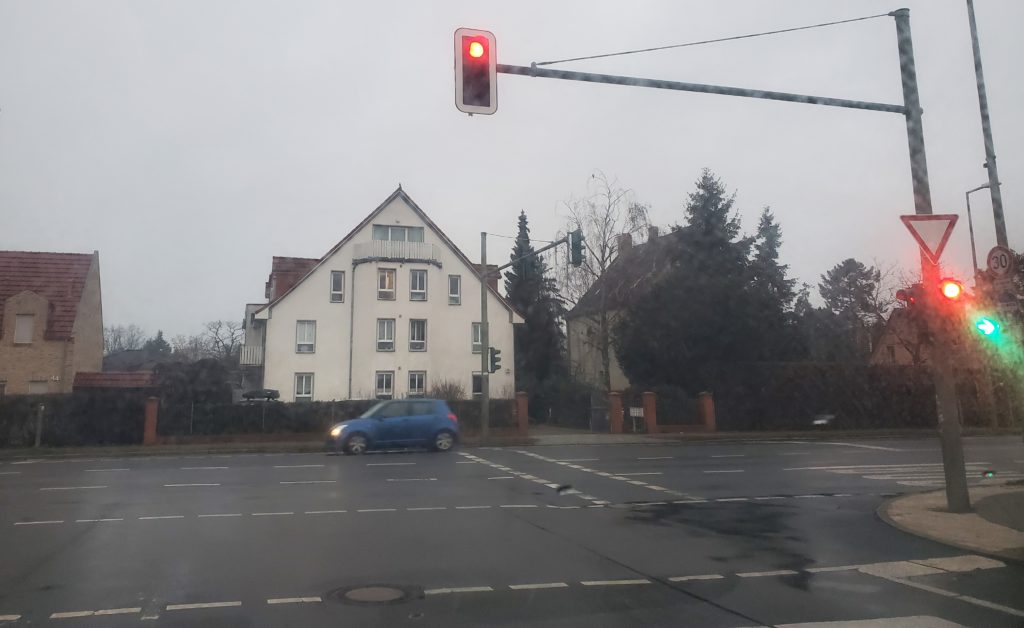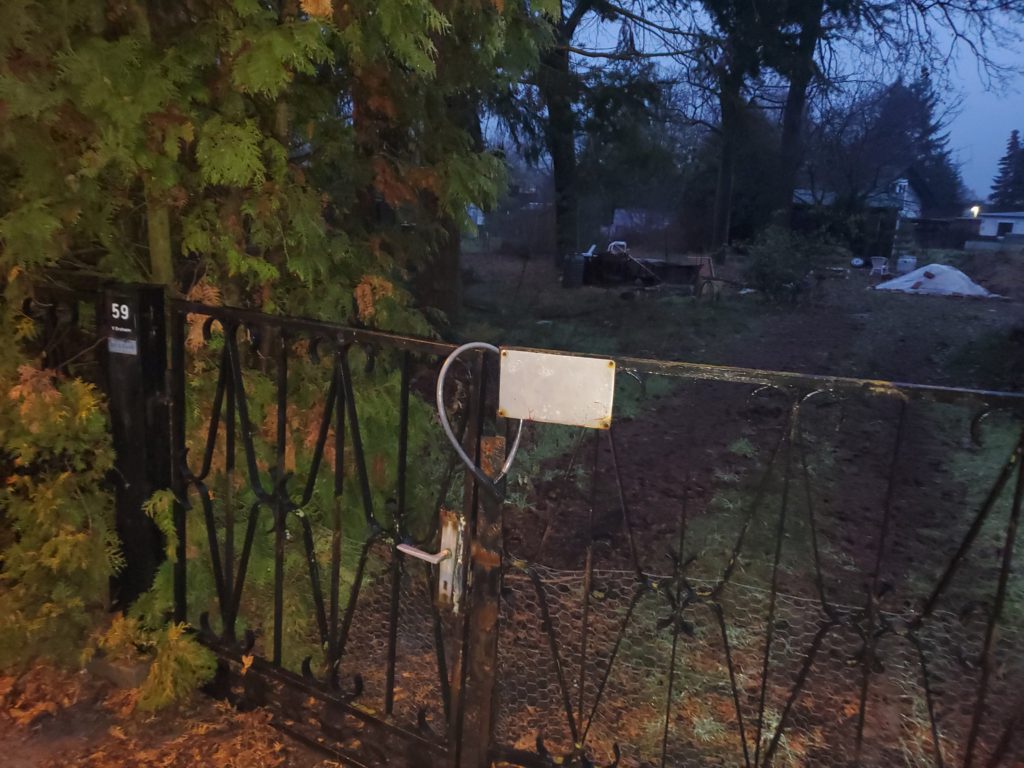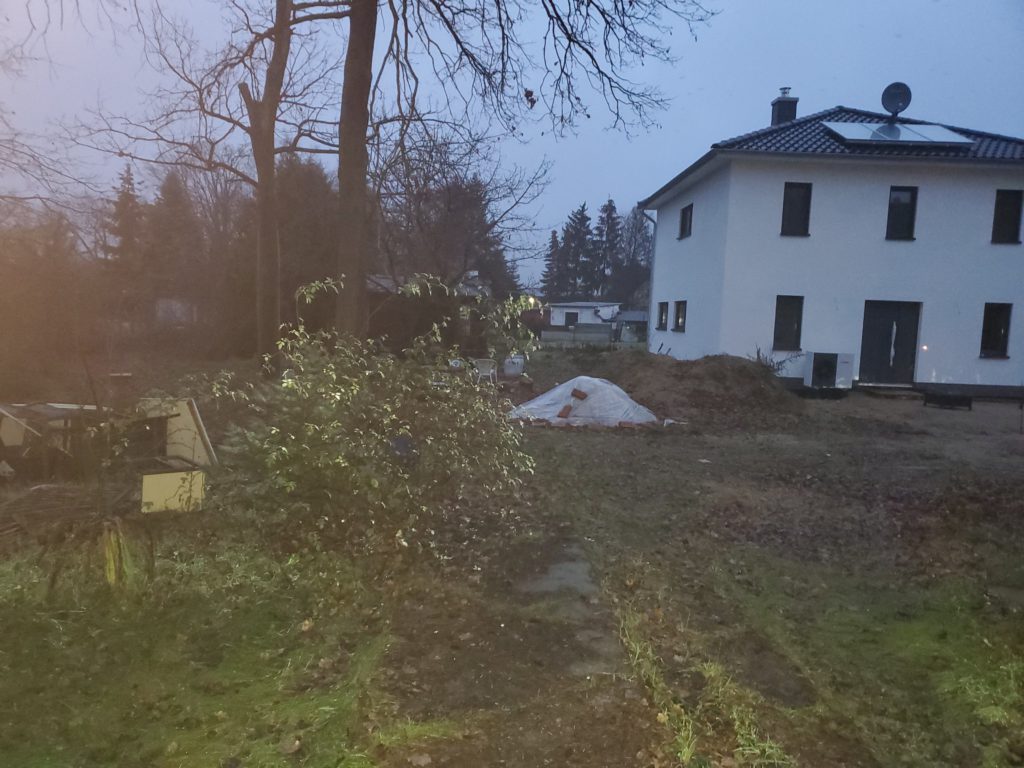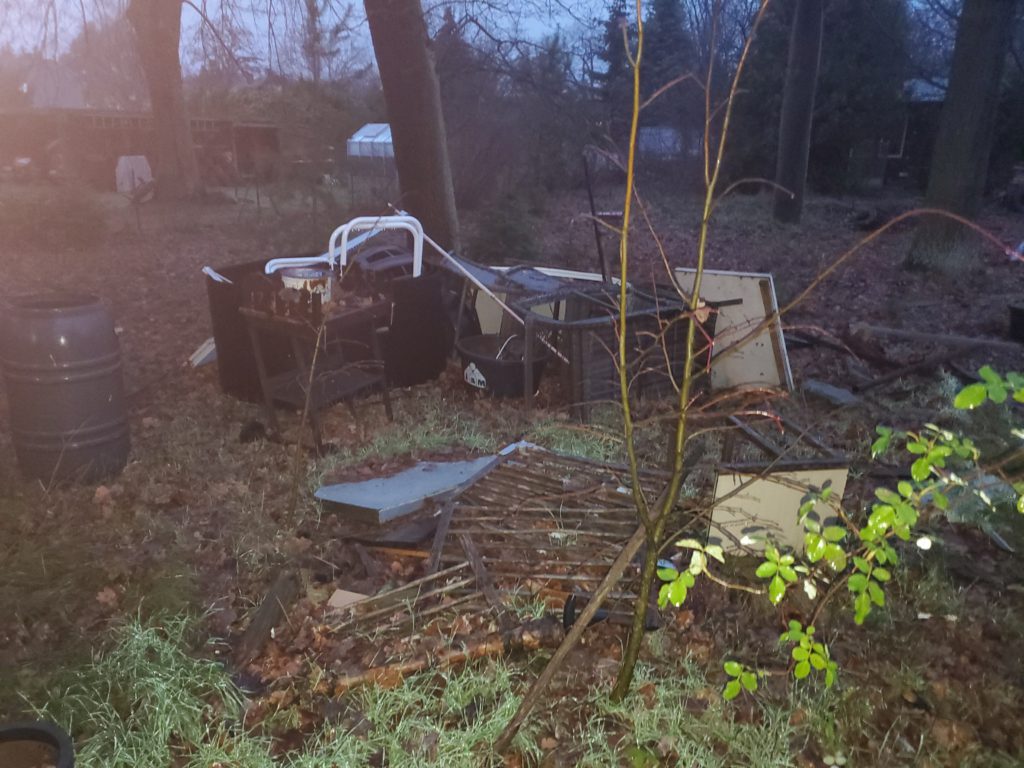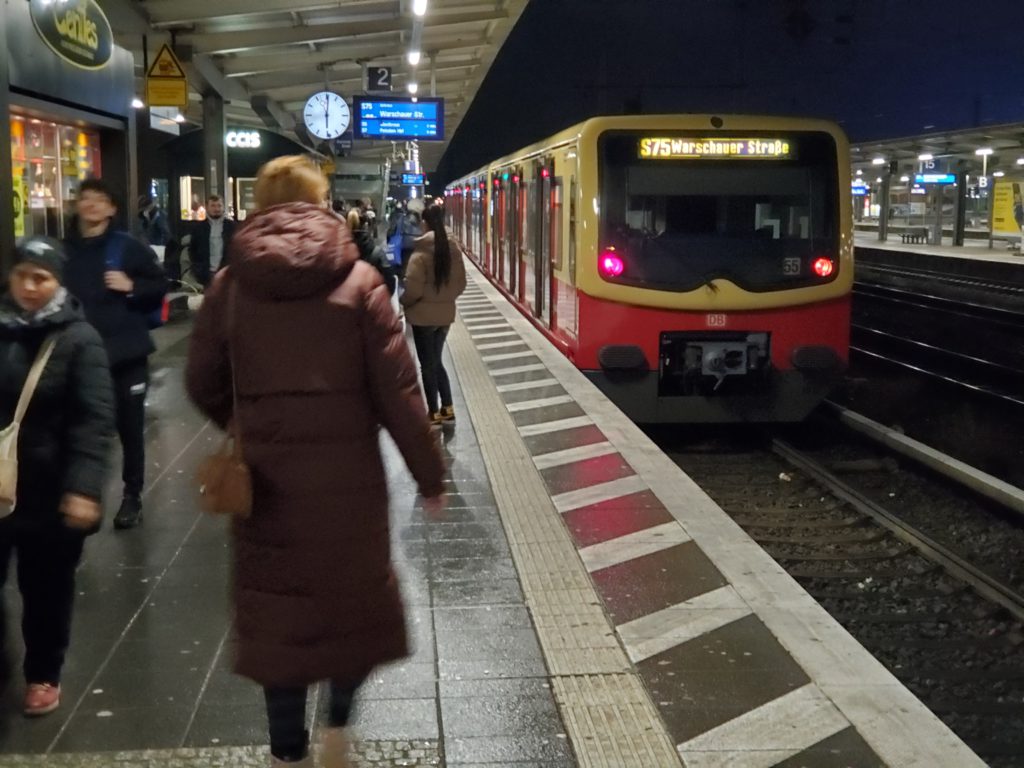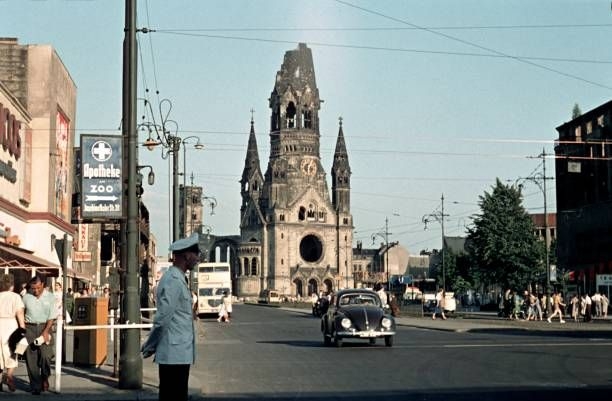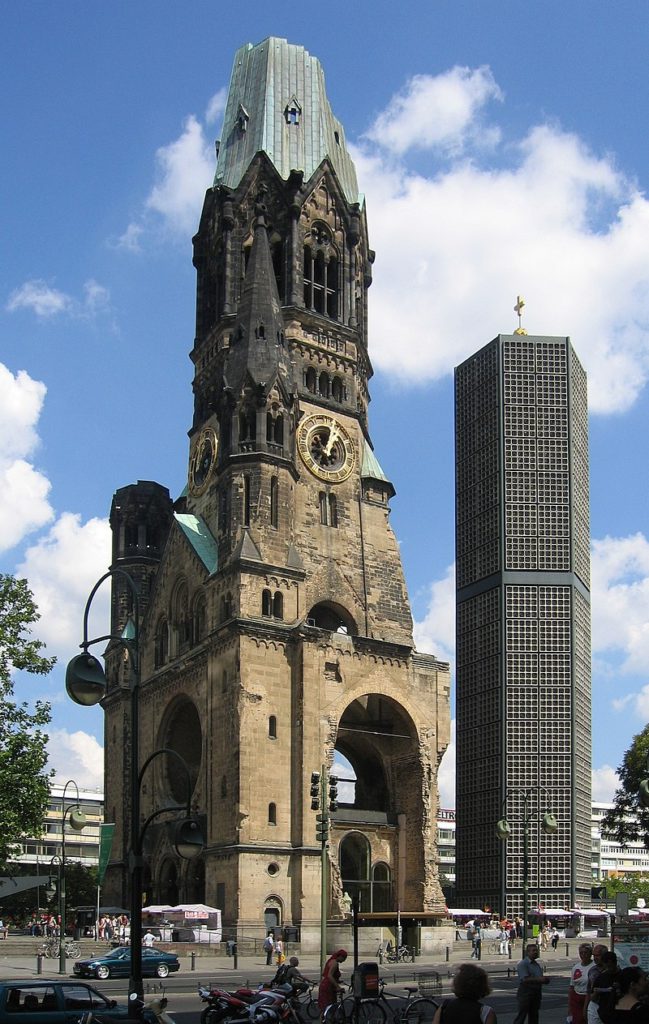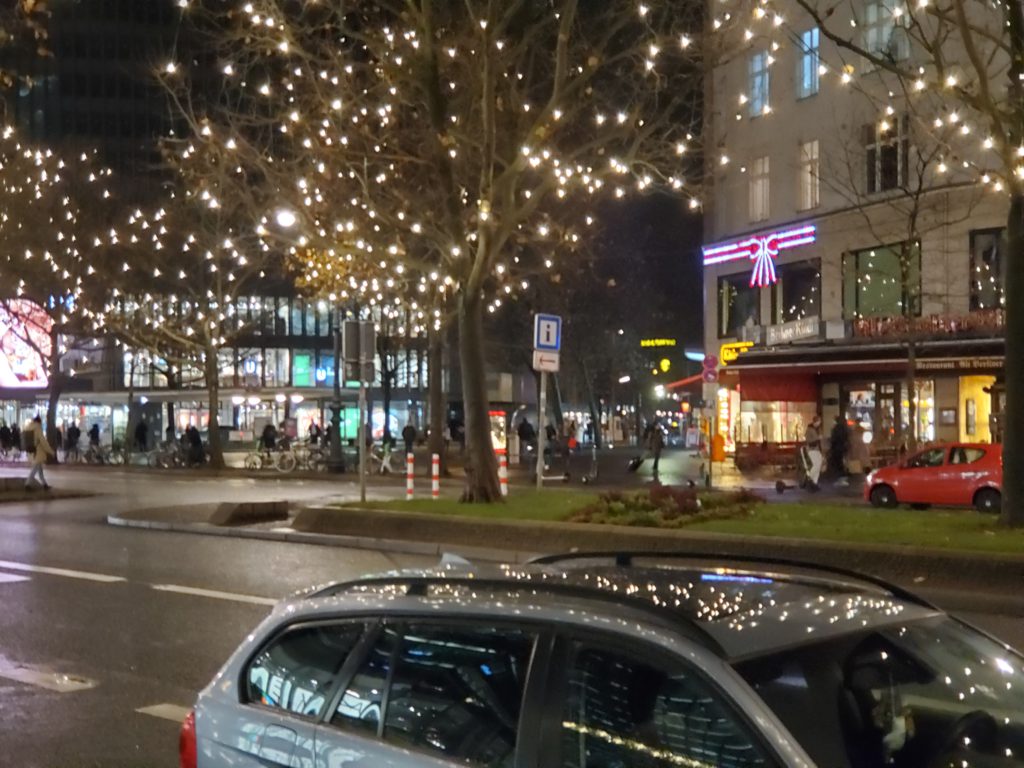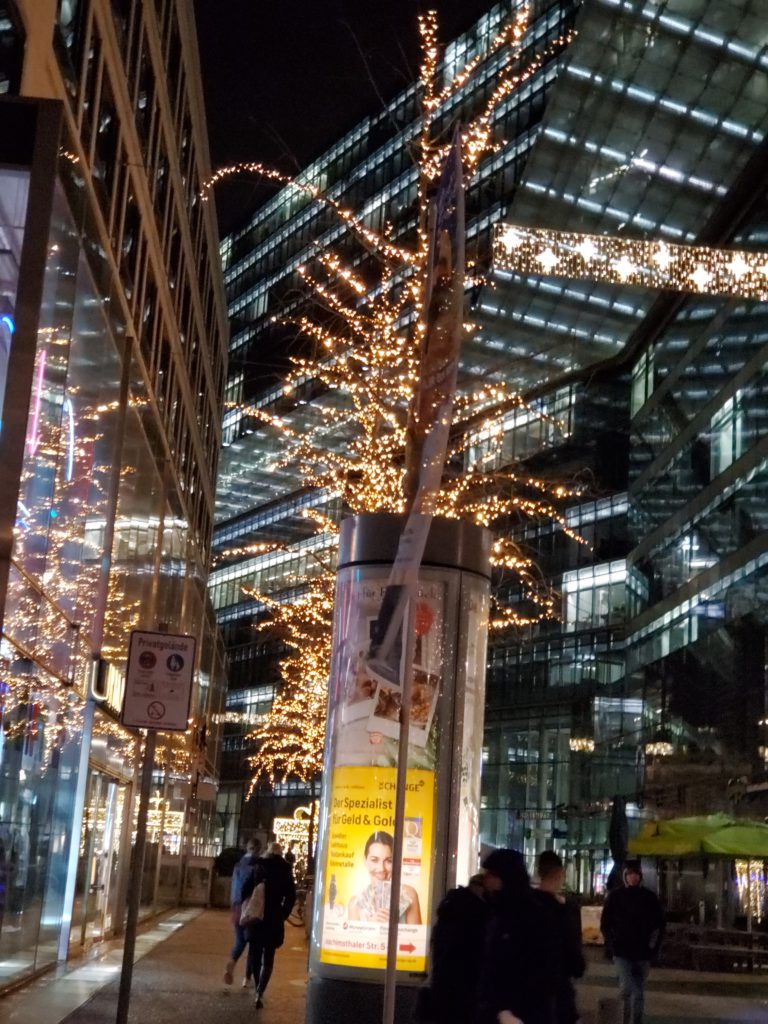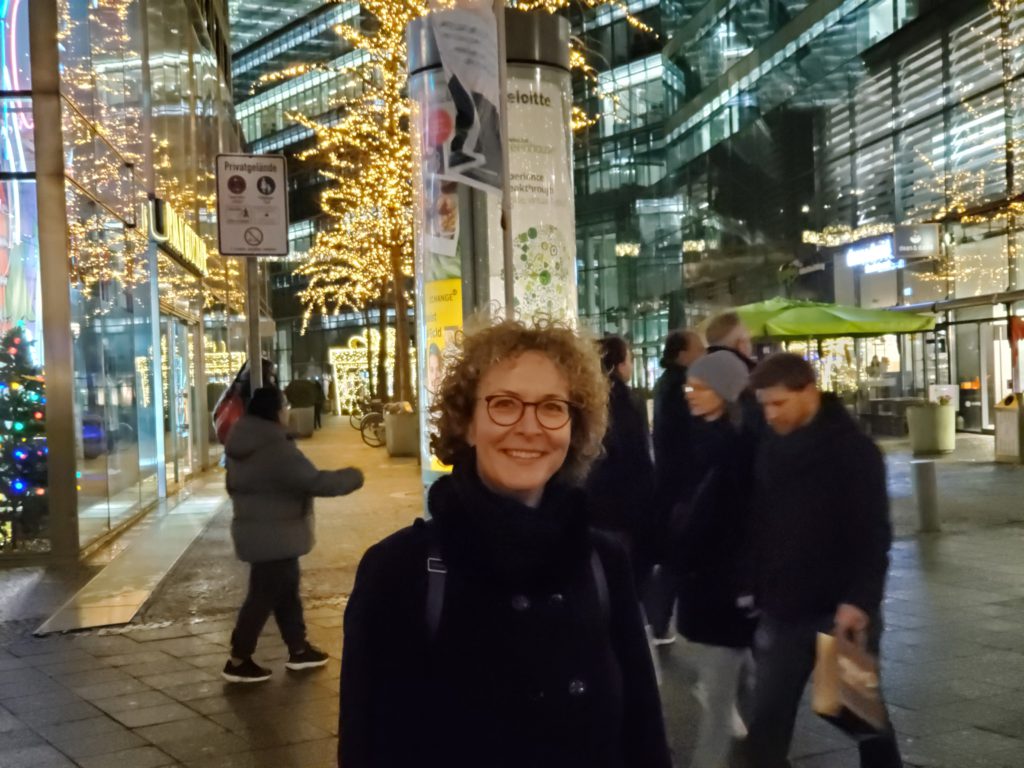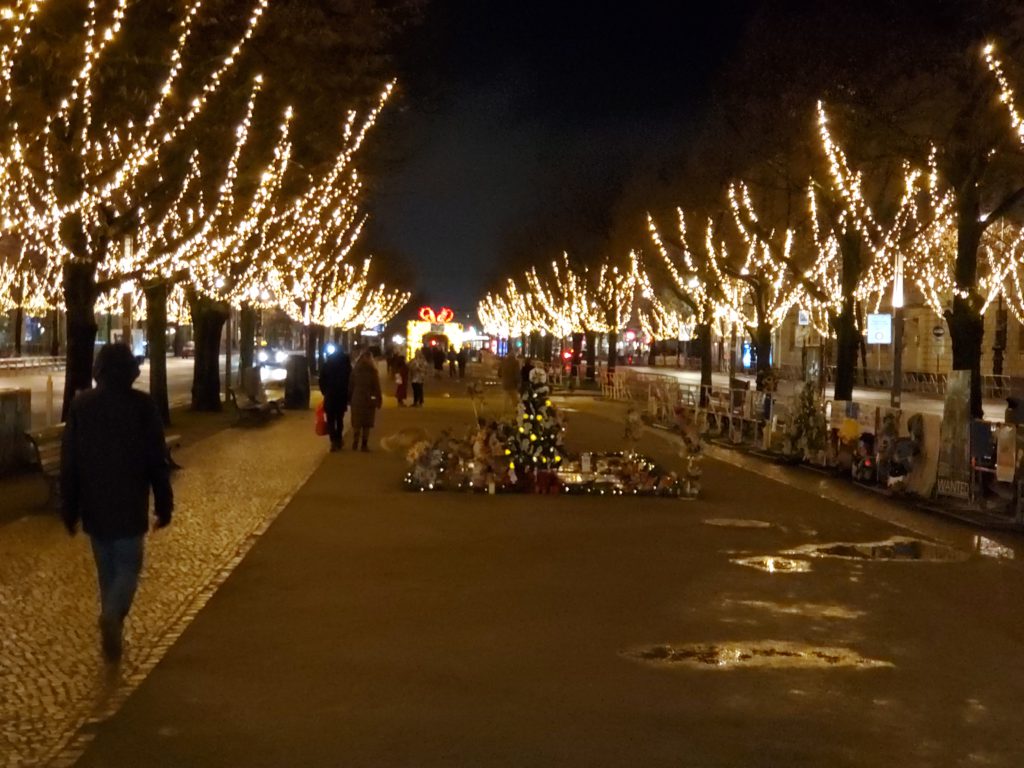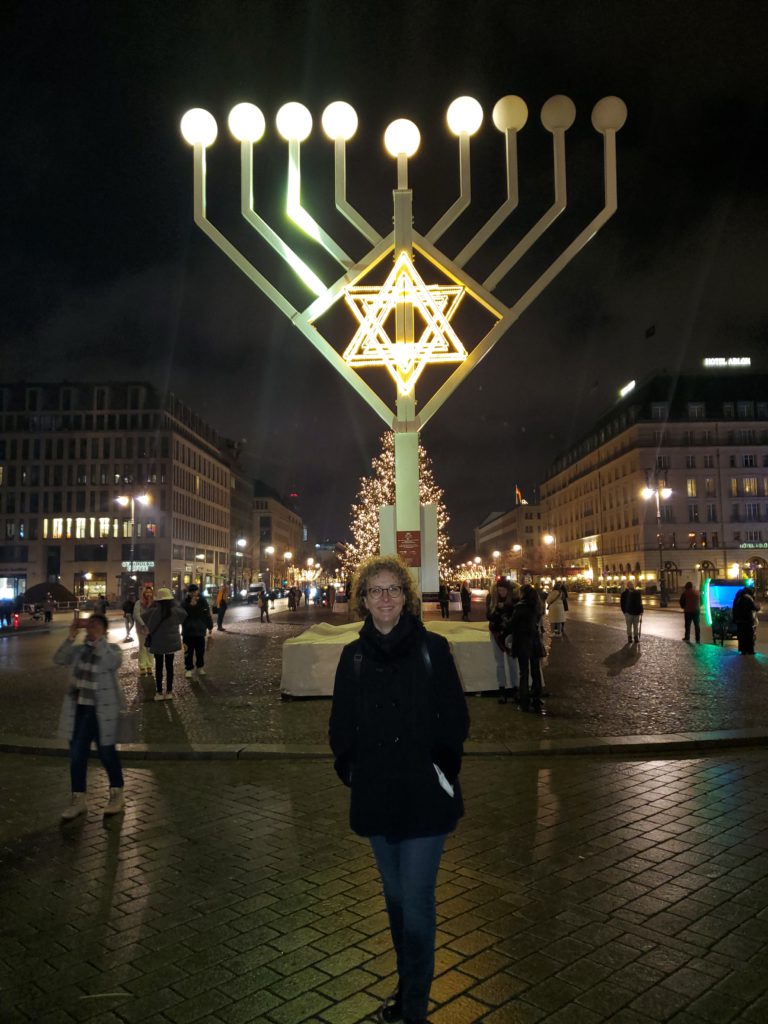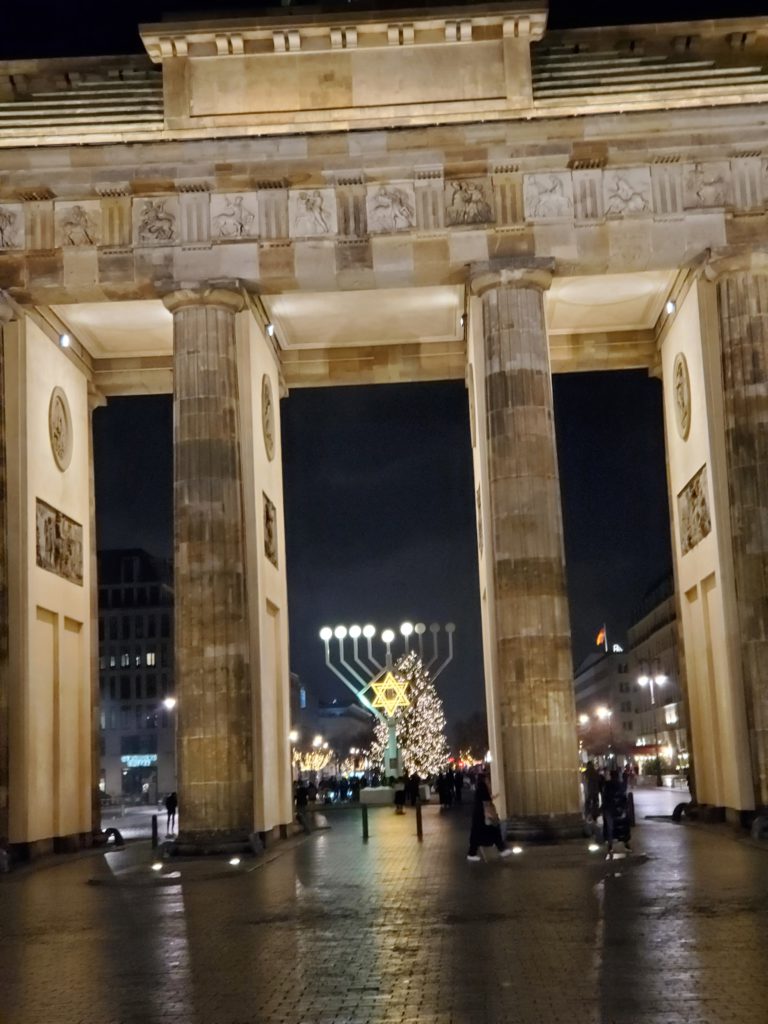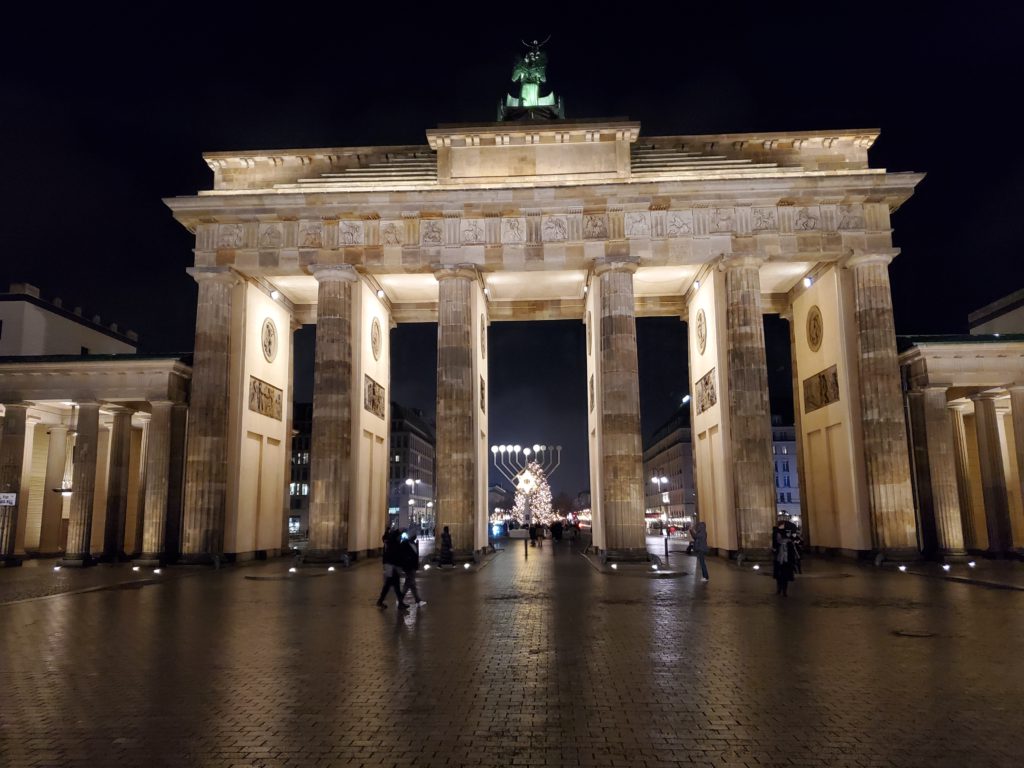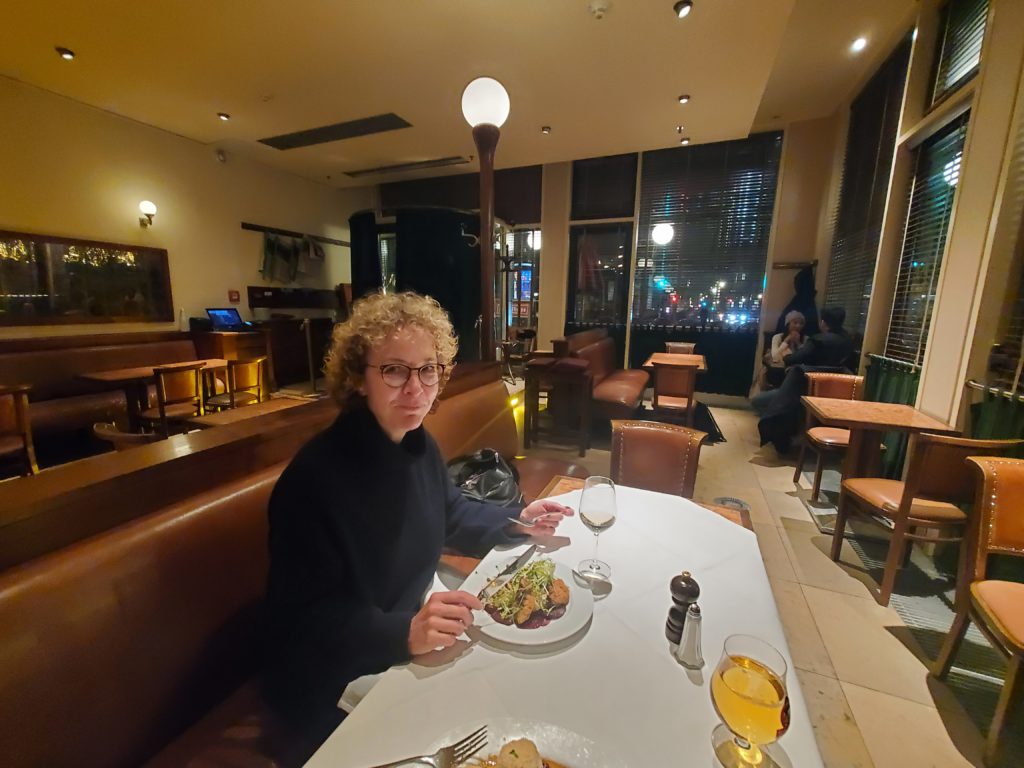There are several ferry routes from ports in southern Spain to Africa. While I figured out which route is the cheapest, I failed to read the departure schedule. Thus, I drive directly to the port of Algeciras so as to reduce the chance of missing a ferry by a few minutes and having a long wait. On arrival, I’m looking for the ticket office but end up at the port entrance with none in sight. A guy standing there asks me where I’m going and whether I’m ticketed and when I say, “No,” he says, “You have to hurry. Follow me,” and starts running toward the garage. I drive behind him, bewildered as to what’s going on.
At the garage entrance, this guy jogs up the ramp to an upper floor and then speeds down the length of the garage to guide me into a vacant space. Car parked, he leads me on foot — no longer running but at a very brisk pace — to the stairway, pointing out the ticket machine where I have to pay before leaving the garage. Then it’s back outside, a long walk to the port gate, then to a commercial block, and into a travel agency. When he suddenly disappears, I’m thinking this is some amazing customer service.
When the ticket agent gives me the ferry price, substantially higher than I had researched, I realize I’m dangerously ignorant as to what’s going on – i.e. in my usual state. My suspicions are allayed when he offers me a round trip deal that makes more sense — approximately double the lower one way fare I had seen online. I hadn’t planned to commit to returning via the same route but I want to get across the Strait of Gibraltar today, so I consent and buy the return ticket. By now, I’ve figured out this is not the ferry company office but a third party agency. Judging by the lines, it seems such agencies are where passengers buy tickets in person.
As I leave the office, my quick step guide is waiting outside. I thank him for the help and he asks me for a tip. Now I get it. He’s no one official, just a freelancer that hangs around assisting prospective ferry passengers. Regardless, he was a big help and deserves a tip but, unfortunately, I have no Euro cash on me, in fact no cash at all. In two months of traveling, virtually every transaction I made was on a credit card and what little cash I had is gone. I’m prepared for a scene when I have to tell him I can’t tip him but he is amazingly kind and instead of pressing me, fades into the crowd. I feel very guilty but then realize I have several Euros sitting in the Berlingo. I decide to hunt him down later once I’ve retrieved that money.
I make the long walk back to the car, leave the garage and pull into the line of waiting cars. Here is where my ignorance decreases a bit. Online, I was under the impression there was only one ferry company serving this route. Now I see there are three and I’m not booked on my intended line. This doubtless explains the fare variations. I get to the booth for my line and I’m issued the actual ticket. Once parked in the loading line, I ask how long the wait will be and am told about 90 minutes. Great, this is my chance to deliver the tip. I fish almost 5 Euros from the various slots and holes where the coins ended up, leave the car, and set out on foot to find my guide. After all, he must return to the entry gate regularly looking for new customers. My supposition doesn’t pan out. I walk around to various points in the port, in a light rain, for over an hour but can’t find a trace of him. When I ask other freelancers where he is, describing his physical appearance, a few of them say they’ll give him the money. That ignorant I ain’t. When I hear engines starting up I have to admit defeat and run for my car. Since I have to come back this way, I decide I’ll pay him on my return to Spain.
[NOTE: To enlarge any image, right click it and choose “Open image in New Tab” or similar.
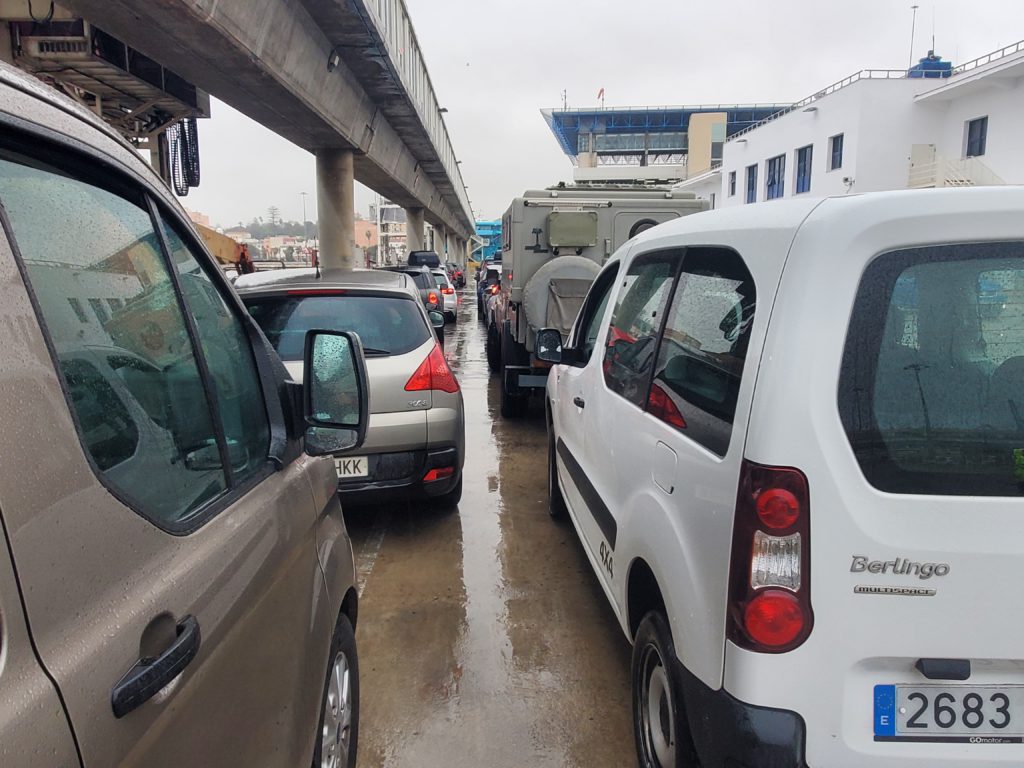
Ahead of me in line is a rugged camper. You see these all over the world, usually with German license plates. They range from modest conversions such as this one, a remodeled Toyota Land Cruiser, to stem to stern rebuilds of full size military trucks, even 6x6es, into self contained expedition vehicles. The owners are typically on multi-year road trips and often ship their rigs between continents. They look really great and incredibly capable but if I had one it would be my undoing. That go anywhere design would, inevitably, someday get me trapped in a raging river or hanging off the edge of trail narrower than the truck. With just basic, not-high-clearance 4 wheel drive, I’m very careful not to exceed the car’s limits. Even so, I’ve been in places — with ruined shock absorbers and no muffler — where a final breakdown would have resulted in a $2,000 towing bill — or more if a helicopter lift was needed.
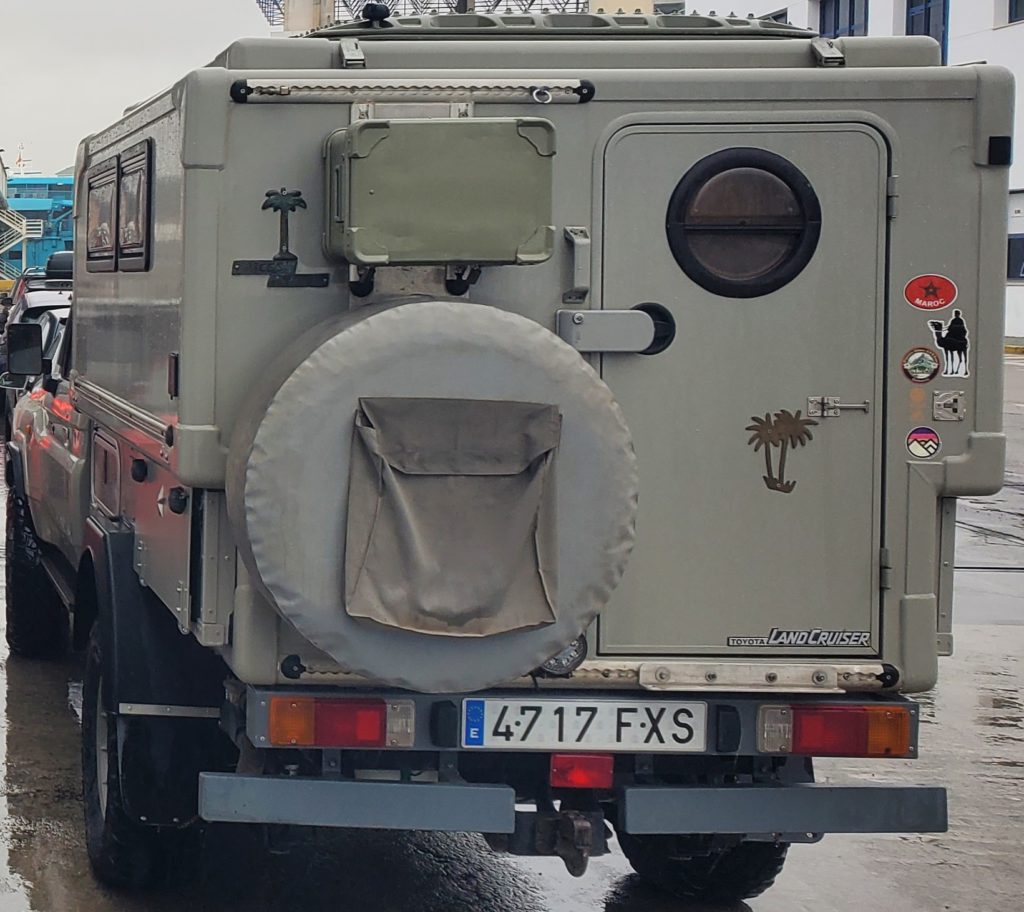
My ferry docks and cars are quickly driven off before we drive on.
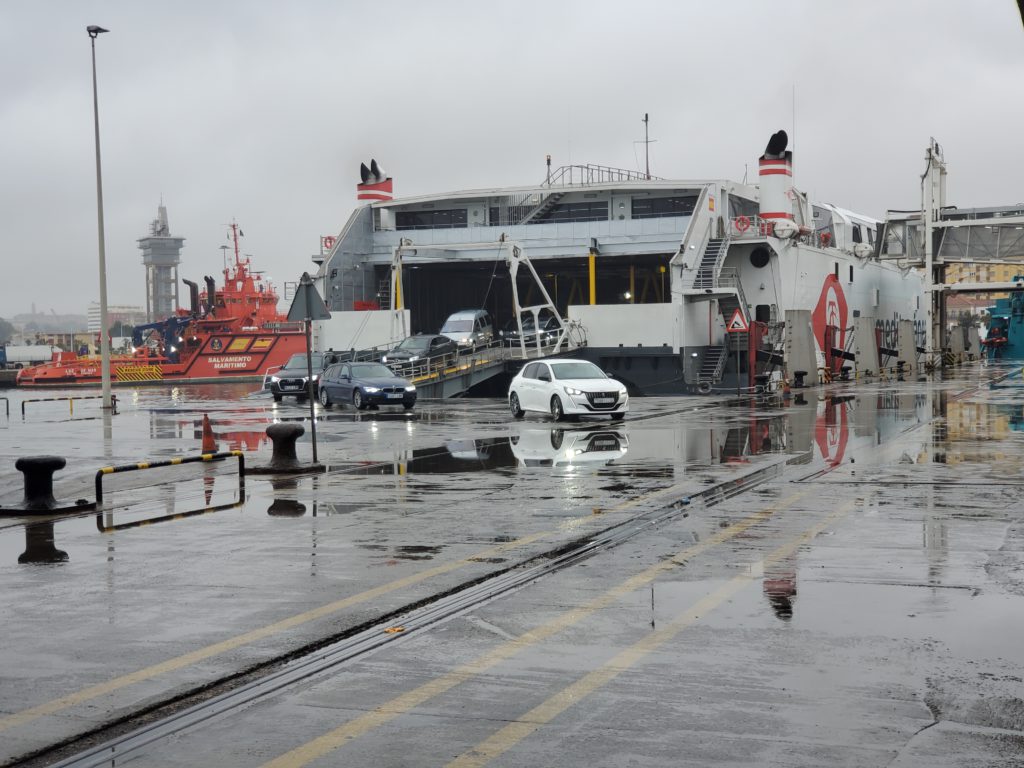
Once the car is on board, I head upstairs to find a chair. Following my lifelong habit, I sit myself as far forward as possible. Through decades of riding the subway, I’ve always positioned myself so I could look out the front window, even in mostly featureless tunnels. As I sit down, a crew member walks by and warns me that I’m in the portion of the ship with the most up and down motion. Although the Strait of Gibraltar is one of the most famous waterways in history, the crossing is uneventful, however.
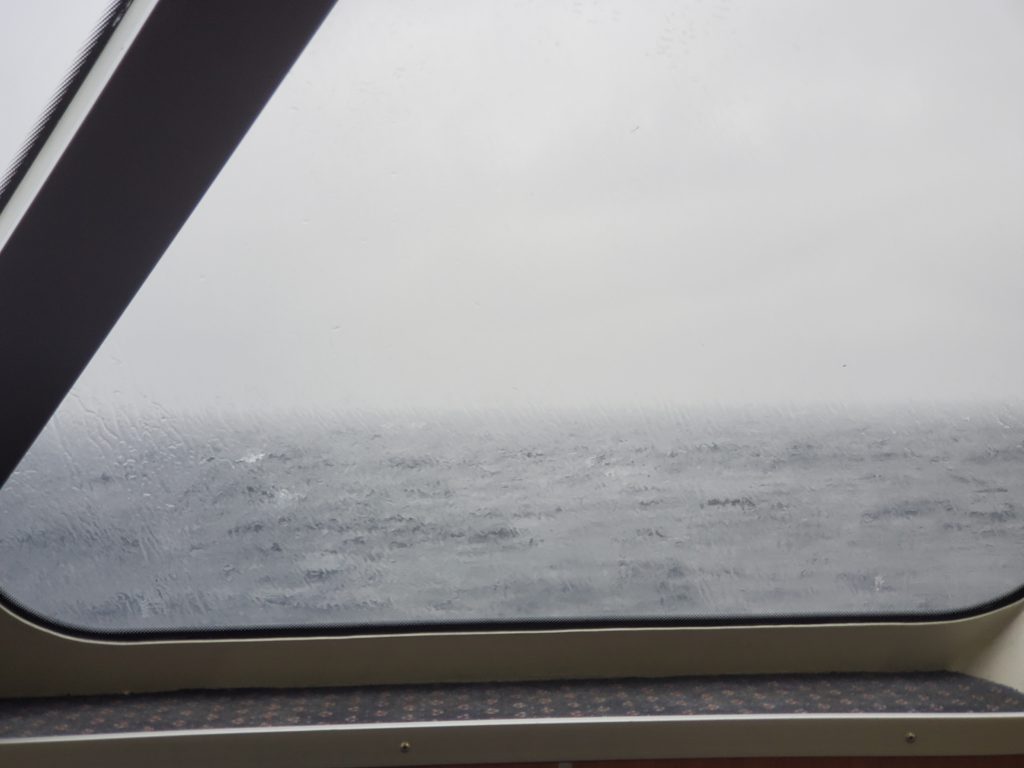
In about one hour of overcast skies and gray water, we dock in Ceuta, one of two small Spanish enclaves on Morocco’s Mediterranean coast. I get fuel (substantially cheaper than in Europe), and find a long line at the Spain-Morocco border.
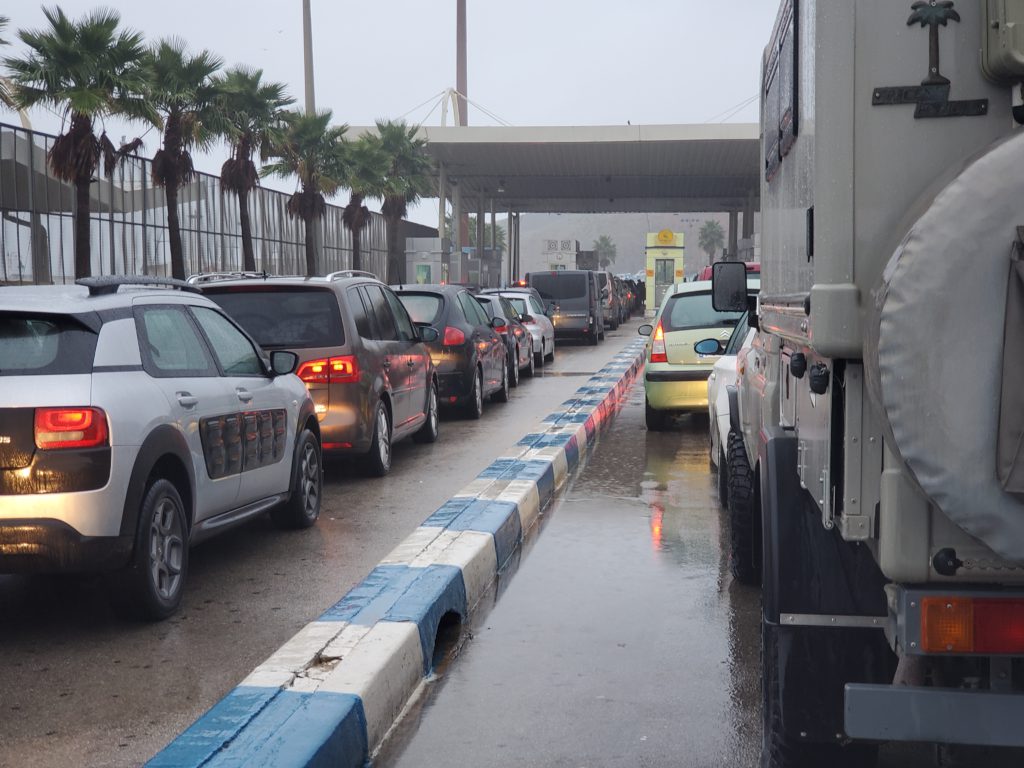
Border formalities are no big deal, but each car requires about 5-10 minutes to get cleared. By the time I’m through, darkness has set in and I have about a one hour drive to Tangier, where I’ve booked a hostel bed. The road follows a hilly, sinuous coastal route, complicated by long patches of fog, but eventually I arrive in the correct spot in Tangier. My lodging has no identifying sign and after communicating with the owner a couple of times, I finally zero in on an apartment building, one of whose units is the hostel.
Once through the entry process, I find a 4-bed dorm room, 2 private rooms, and a refrigerator in more need of defrosting than Nancy Pelosi but no kitchen — I won’t be cooking here. In an effort to encourage proper guest behavior, the rooms are filled with professionally made signs posted on the wall — dozens of them. It’s pretty amusing but I know some hostel guests are barely housebroken.
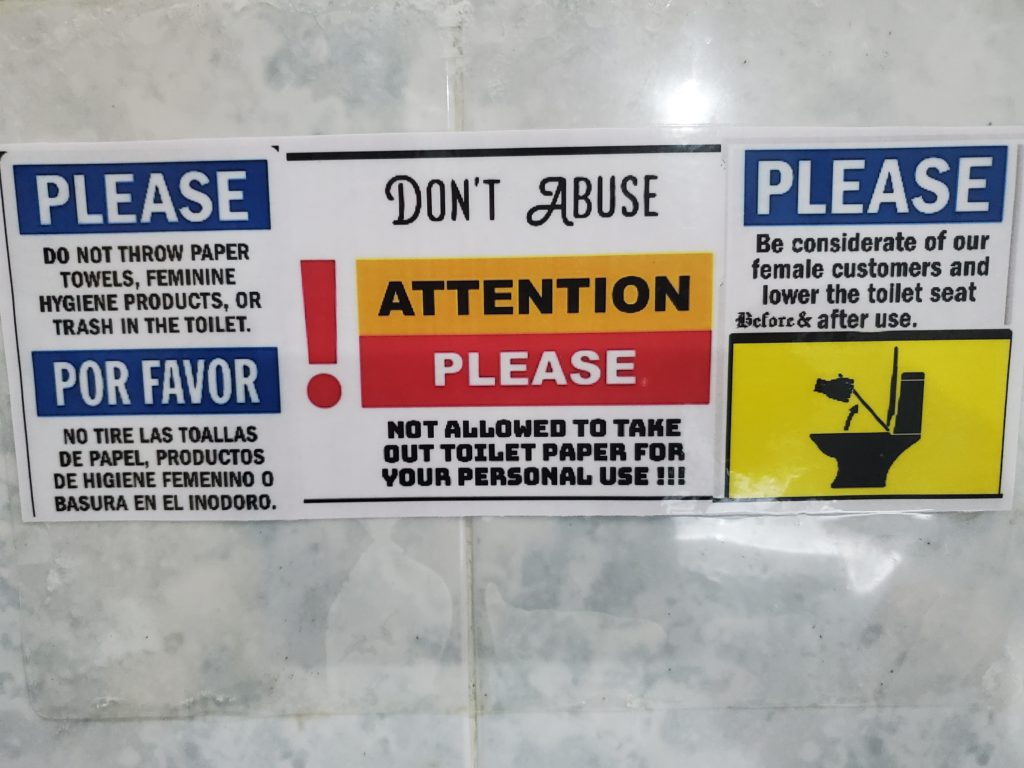
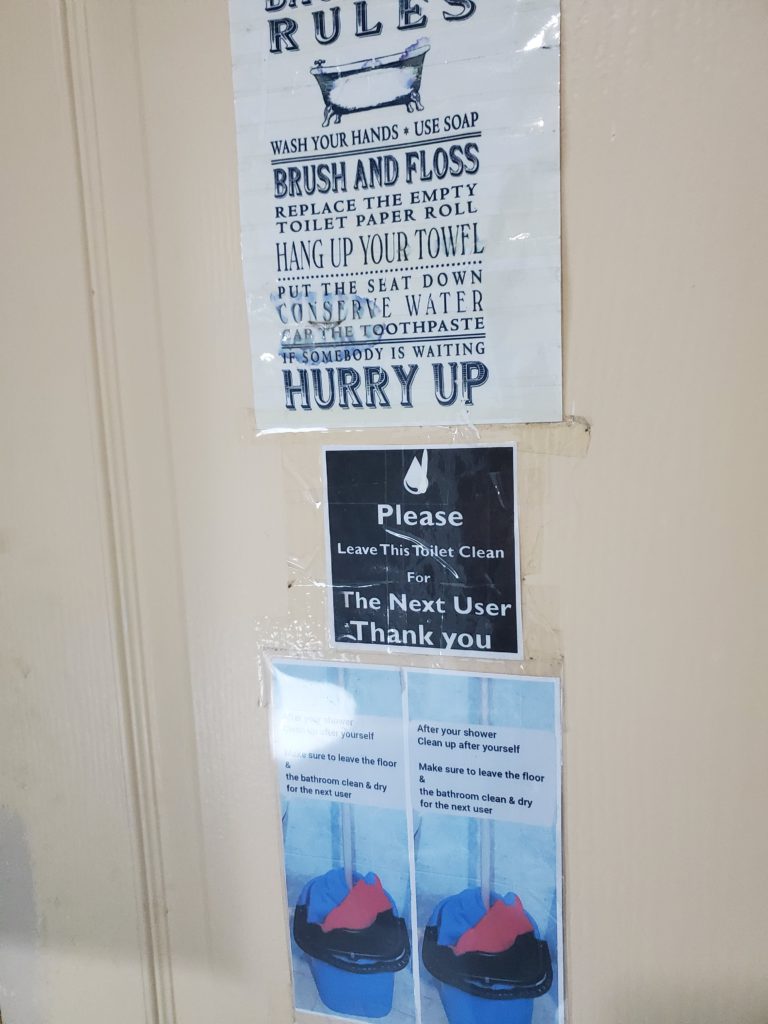
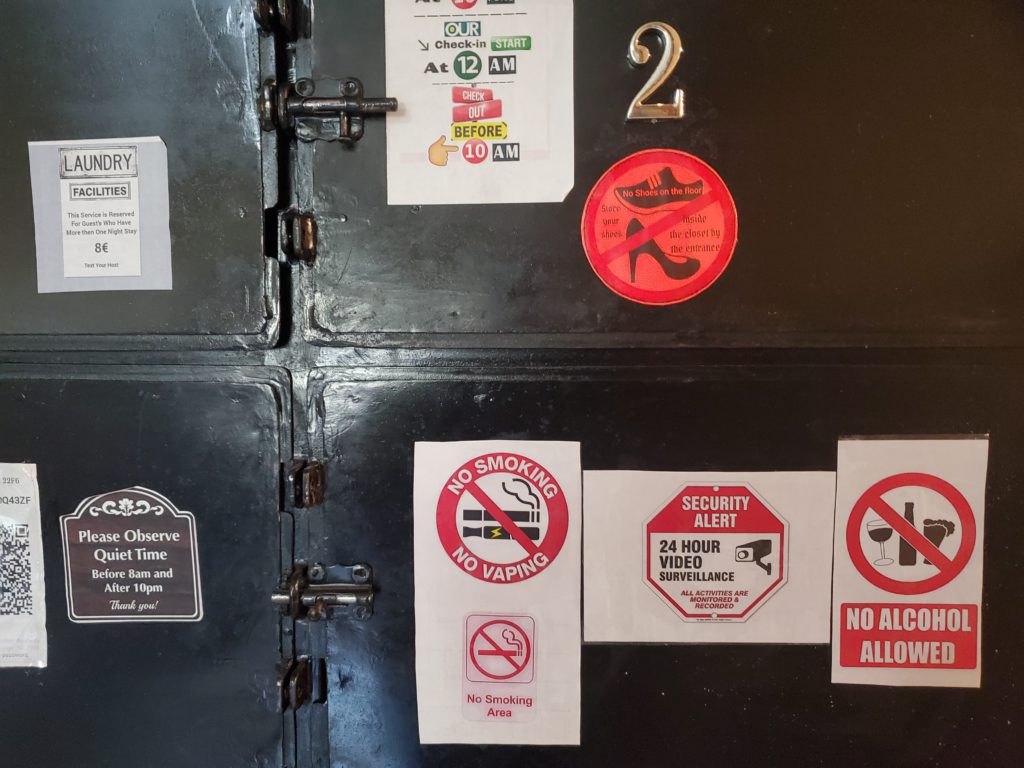
There are two Chinese guests sitting on the couch, strangers to each other, and I get into an interesting conversation with the woman. She’s from Hong Kong, travels a lot on very little money, and appears to be looking for a new country to call home. The bunk beds are interesting. Instead of a ladder providing awkward access to each upper bunk, each has a full stairway to the floor at the foot. It’s a really nice design but the extra floor space required for it means most hostels will never adopt the idea. Fairly late in the evening, after walking the quiet streets to buy some fluids, I crawl into my lower bunk and fall rapidly asleep.
Thursday morning, I decide to sightsee Tangier. Credit card acceptance in Morocco is mostly limited to tourist establishments and gas stations, so my first task is to get some dirham currency from an ATM. I don’t miss the old days, pre-ATM, when we carried American Express or Thomas Cook travelers checks and traded those for local cash. In many countries, the official exchange rate was massively overstated so instead of banks it was necessary to go to currency shops or, dicier, street entrepreneurs. I vividly remember the universal pitch from these guys, “Change money?” — stated in whatever language got the message across. Typically, an affirmative response led to a semi-furtive trip into an alley, some rate negotiation, and a quick exchange. Plus, there was always the thrill of maybe being robbed, being given counterfeit bills, or arrested. Nope, don’t miss those days at all. Using the ATM now is even sweeter since my kids turned me on to Charles Schwab accounts. Not only does Schwab not charge a fee for ATM withdrawal, they reimburse the fee collected by the local machine, which in some places can run as high as 10% of the amount withdrawn. You can’t beat that with a stick.
I work my way up the street looking for a place to have lunch. It doesn’t take long to find a nice one. Reading the menu and knowing I will be eating plenty of tajines over the next several weeks — because it’s the Moroccan national dish — I decide to try something different. I opt for “tride au poulet et noix et oeufs seman”, which turns out to be chicken over some sort of pastry, with quail eggs, almonds, figs, and lemons. It is truly delicious.

After lunch, I continue my walk around Tangier. My first stop is the Punic-Roman cemetery. This may not sound interesting, but it is and, fortunately, trusty Atlas Obscura called my attention to it. Situated on a rocky outcrop high above the Mediterranean, the rectangular graves are carved directly into the rock. Tangier was founded about 3,000 years ago by the Punic people (also known as the Carthaginians, after the capital of there empire). the cemetery is on the site of an ancient city gate, now long gone. When the Romans conquered Tangier almost 2,000 years ago, the graves were simply emptied out for reuse. Archaeological excavations in 1910 revealed a number of important Roman funerary objects. The boxes carved in the rock are now empty and exposed.
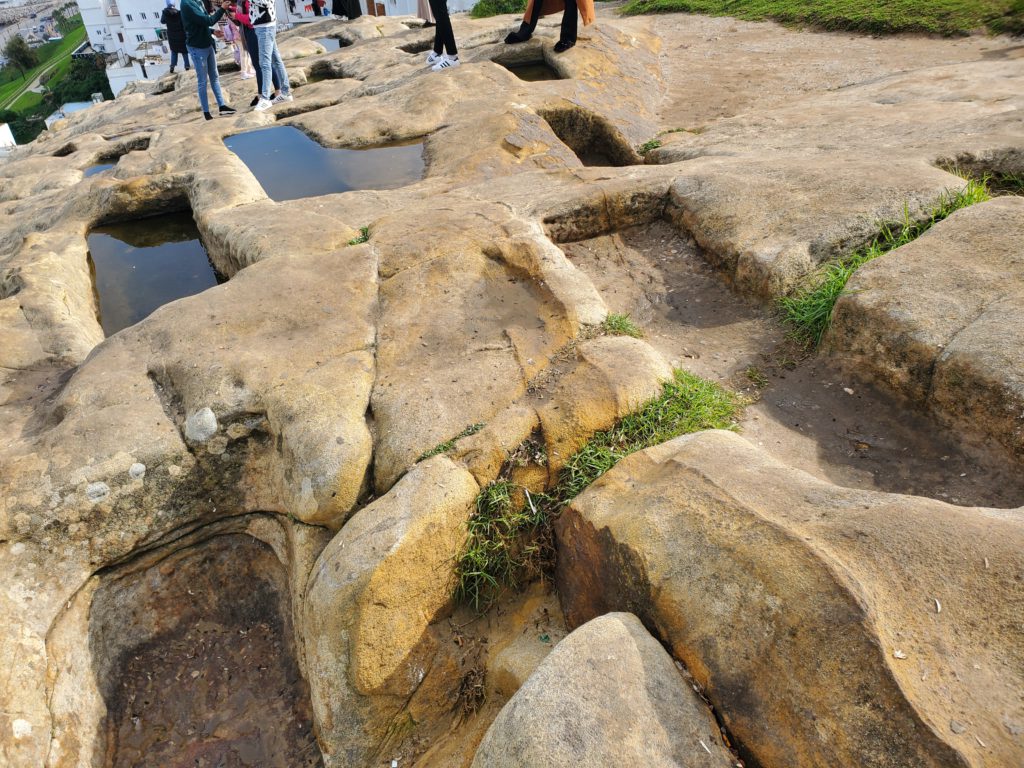
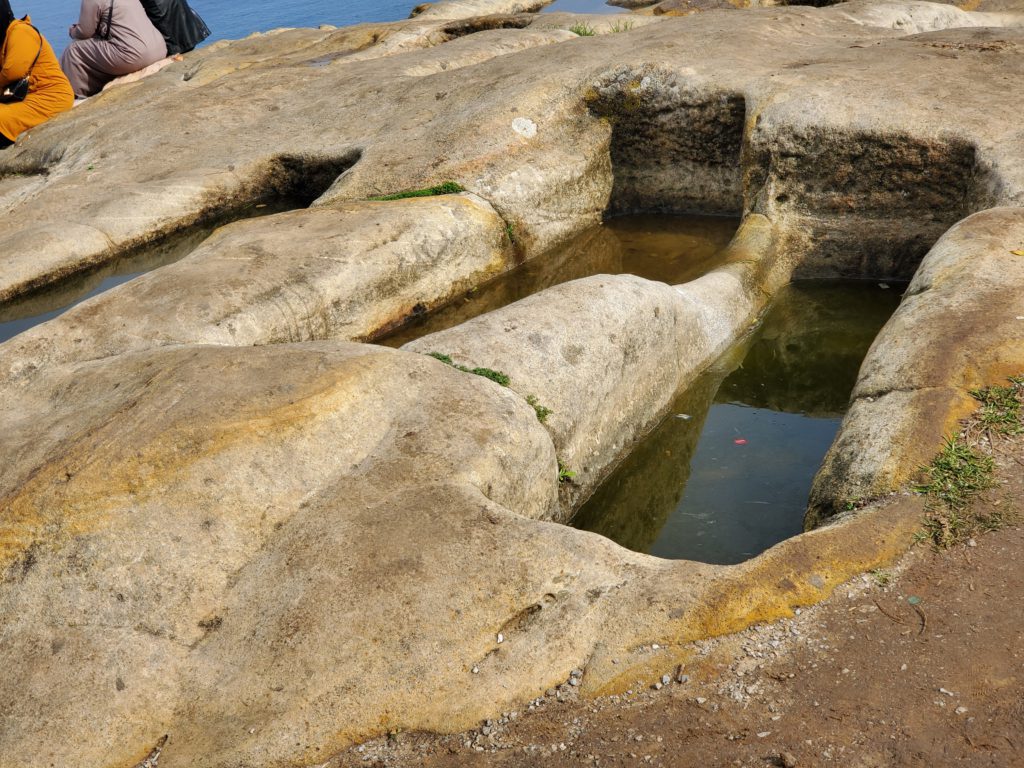
In addition, to the historic aspect, the rock with it’s panoramic view of the Gibraltar Strait, is a popular gathering place for both locals and tourists. In addition to Tangier harbor below, the Spanish coast is also clearly visible.
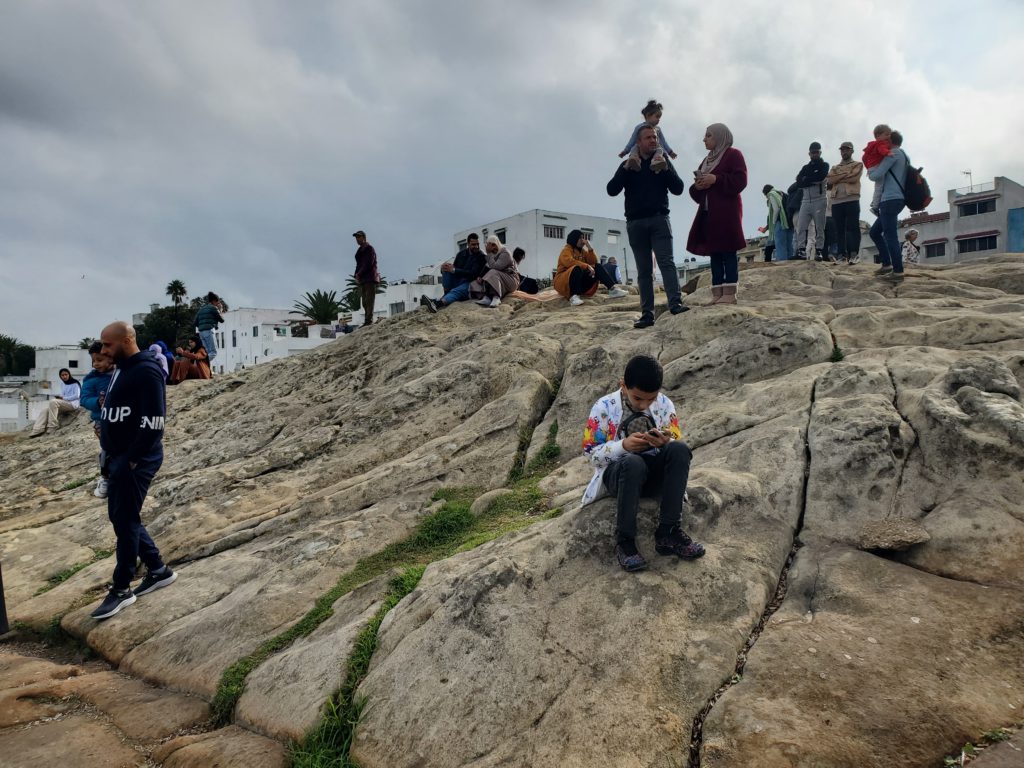
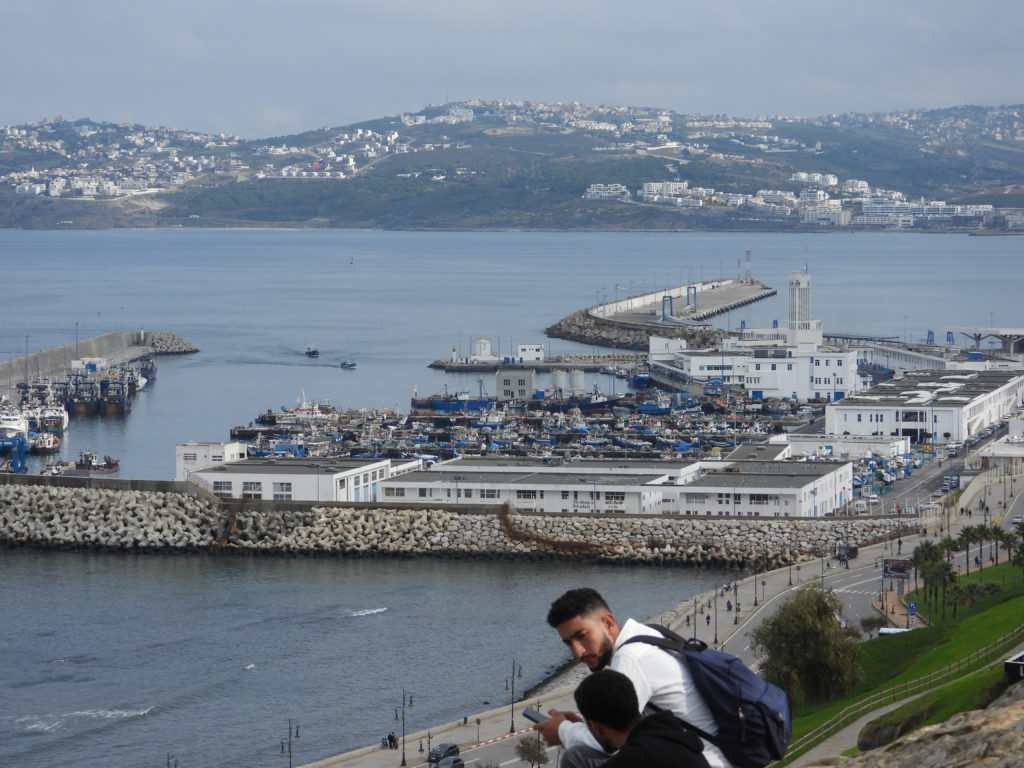
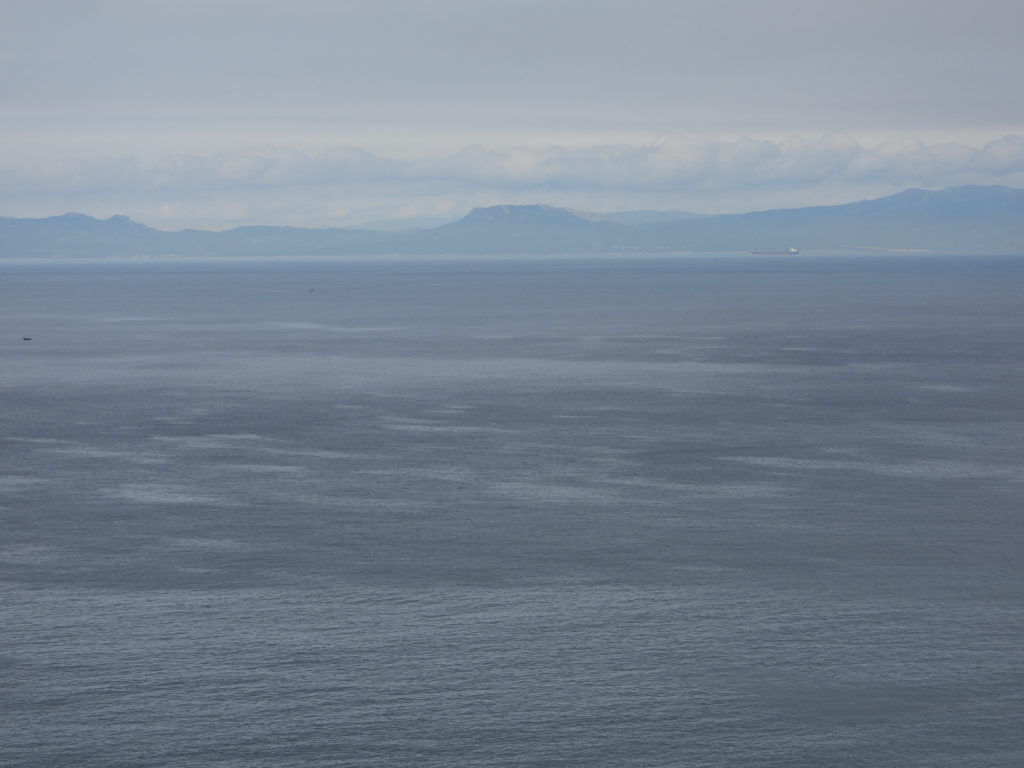
Leaving the cemetery, I head for the Tangier medina, the citadel that long protected the city from attack. Typically, it’s a massive construction, laced with buildings and narrow alleyways within the walls.
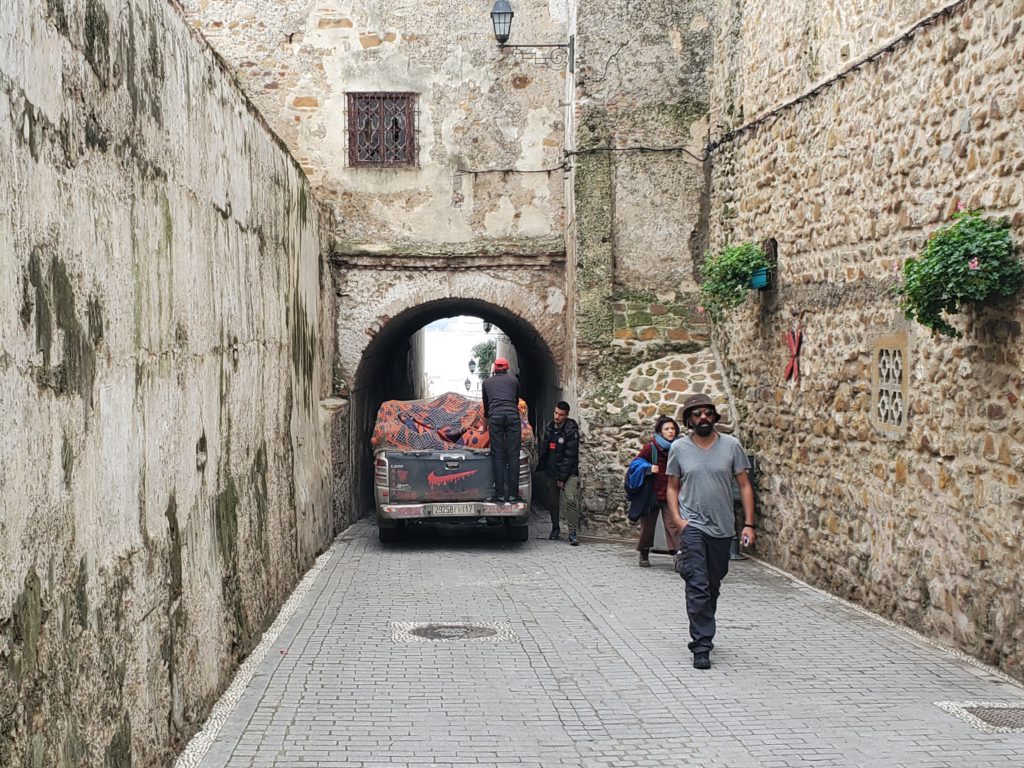
Eventually, I find my way to the other side and exit downhill toward the city.
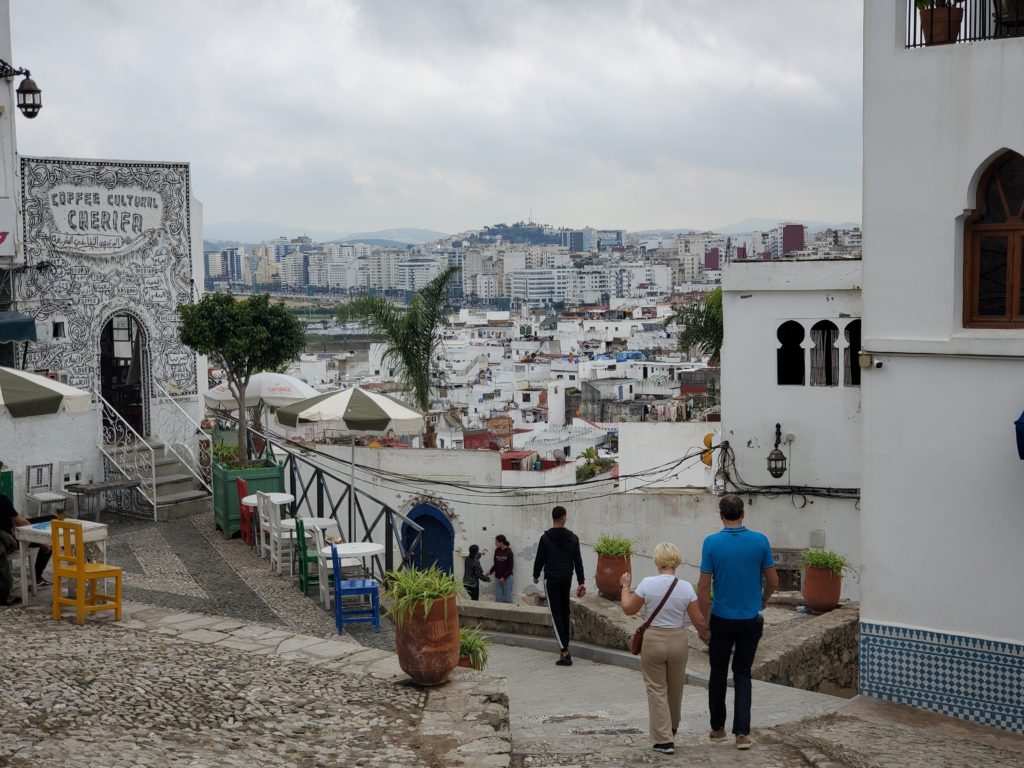
I take a break near a playground and watch kids playing and hijab-covered mothers and grandmothers talking.
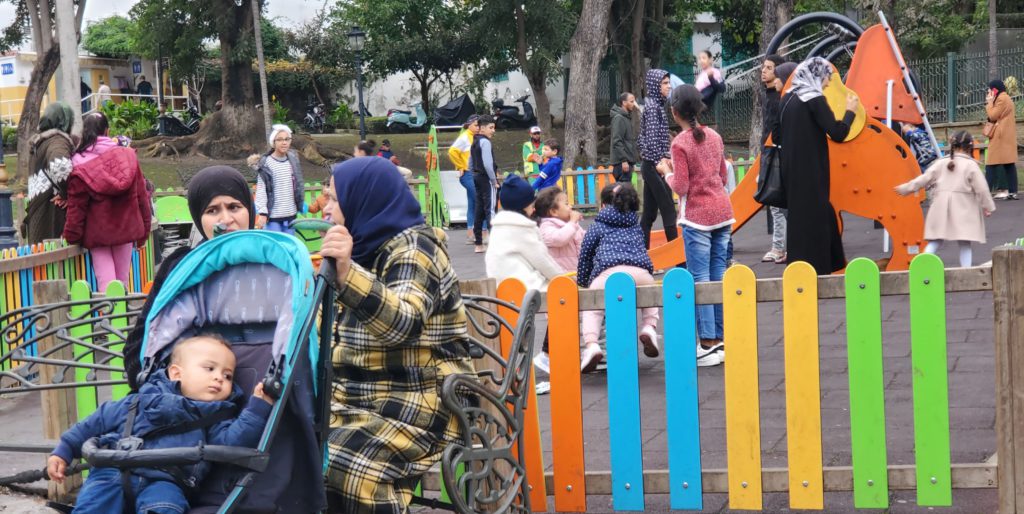
I have to say that as someone who believes human rights completely trump religious and social rules, I’m never comfortable observing the Muslim strictures on women, whether formal, societal, or family imposed. Moroccan women have broader legal latitude than in other Arab countries. Some women, especially in urban areas, have professional careers and eschew head coverings. Of course, many who maintain various degrees of covering do it voluntarily, but for others social and family pressures leave them little room to choose. Every time I get on my high horse about this, I’m slowed up a bit by remembering we have, at least technically, a similar situation. In most of the U.S., women have the same right as men to be shirtless in public yet virtually none do. Society would exert substantial pressure on any women exercising that right although obviously the vast majority cover up by their own preference. Nonetheless, the two issues don’t seem equivalent. In New York City, every time I see a Muslim family walking the summer streets with the husband and children in shorts and t-shirts and the wife shrouded head to toe in a black covering, I find it impossible to believe she is dressed thus of her own free will. I will never believe organized religion, as opposed to personal belief in some higher power, is beneficial. It seems to me the hierarchy and power structure exist for elites to exploit believers, just as in many other human endeavors.
Moving on, I pass through the large indoor market (the souk) and emerge onto an adjacent street also humming with commerce. Here the products are displayed on the sidewalk while various trades operate in small work spaces in in an abutting building. Among them are metalworking and butchery of goats and sheep. For reasons unknown, the shopkeepers don’t want photos taken even though they’re working right out in public, so I retreat across the street and resort to telephoto.
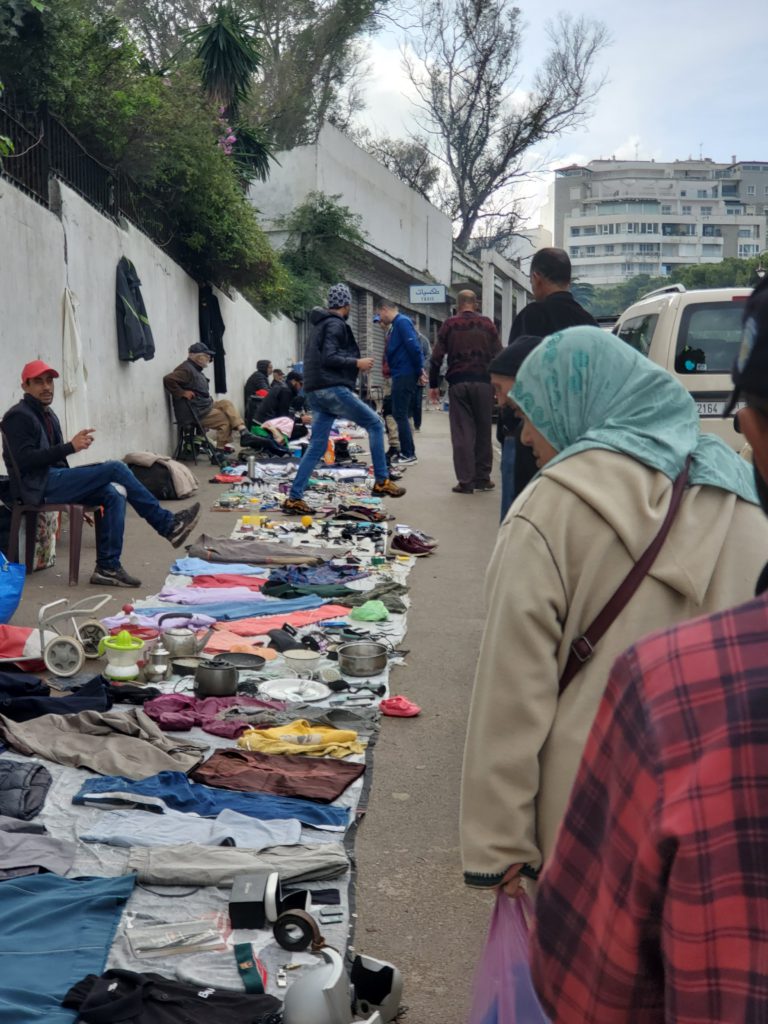
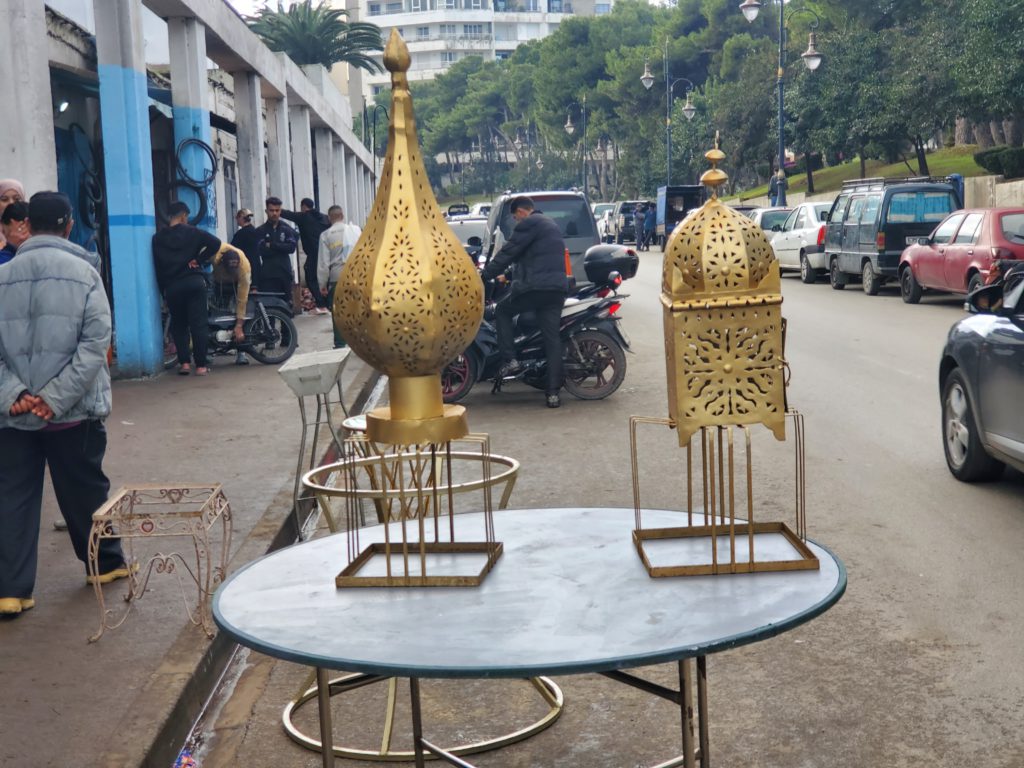
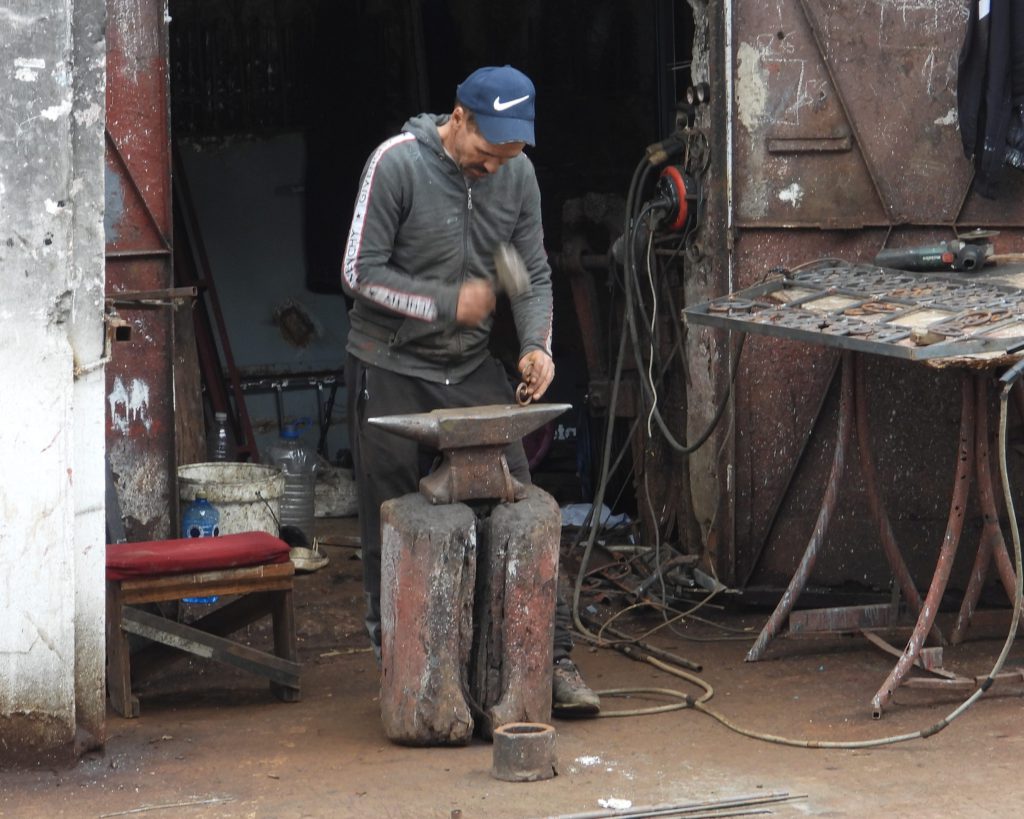
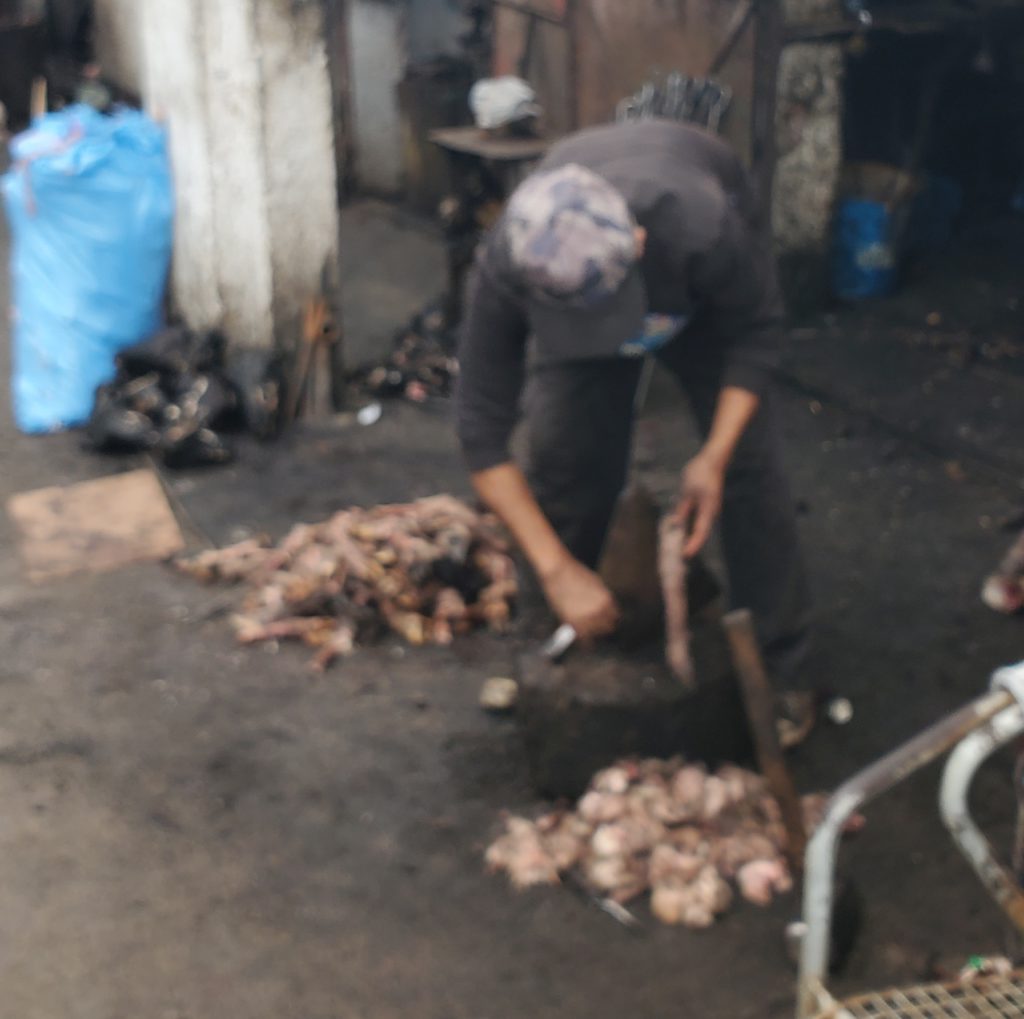
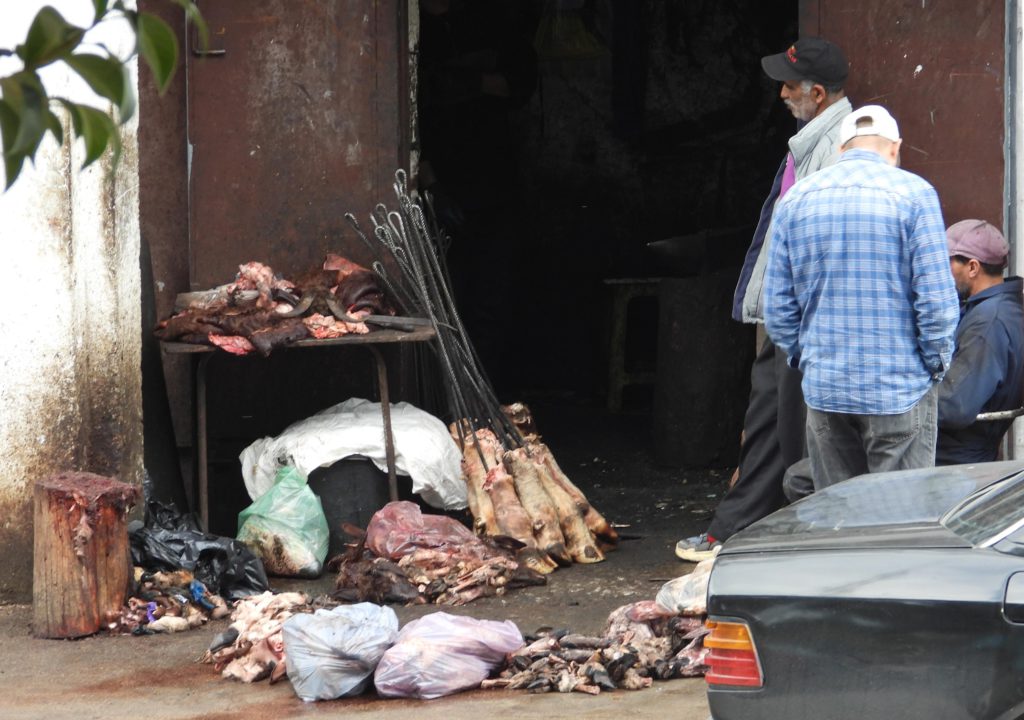
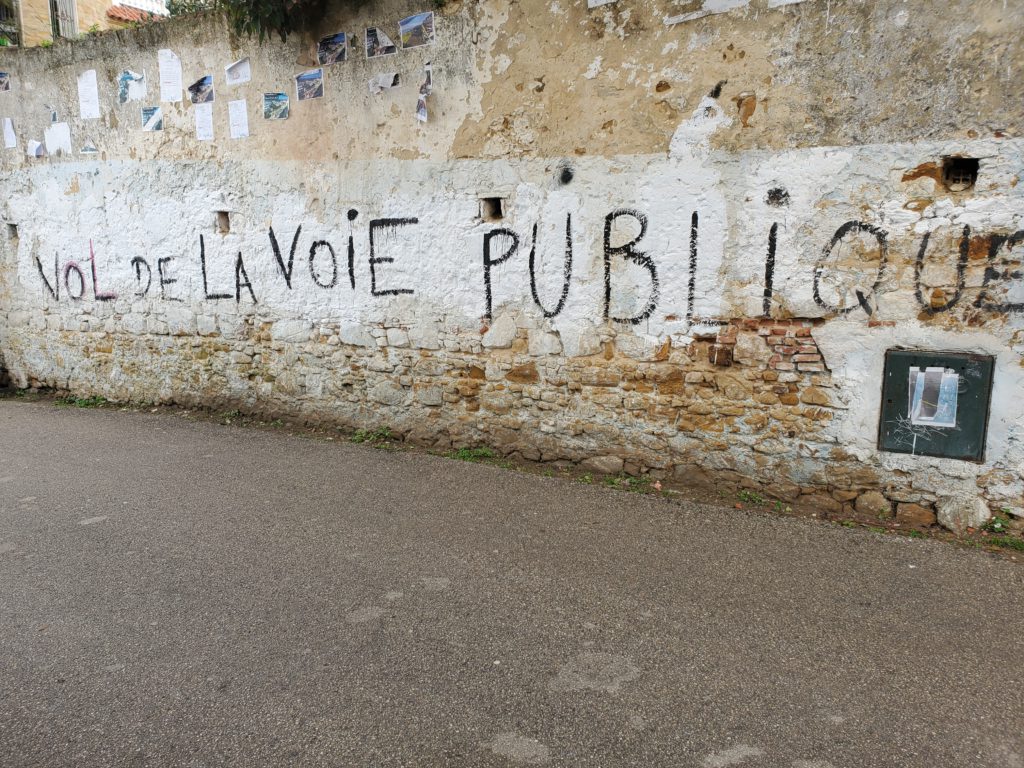
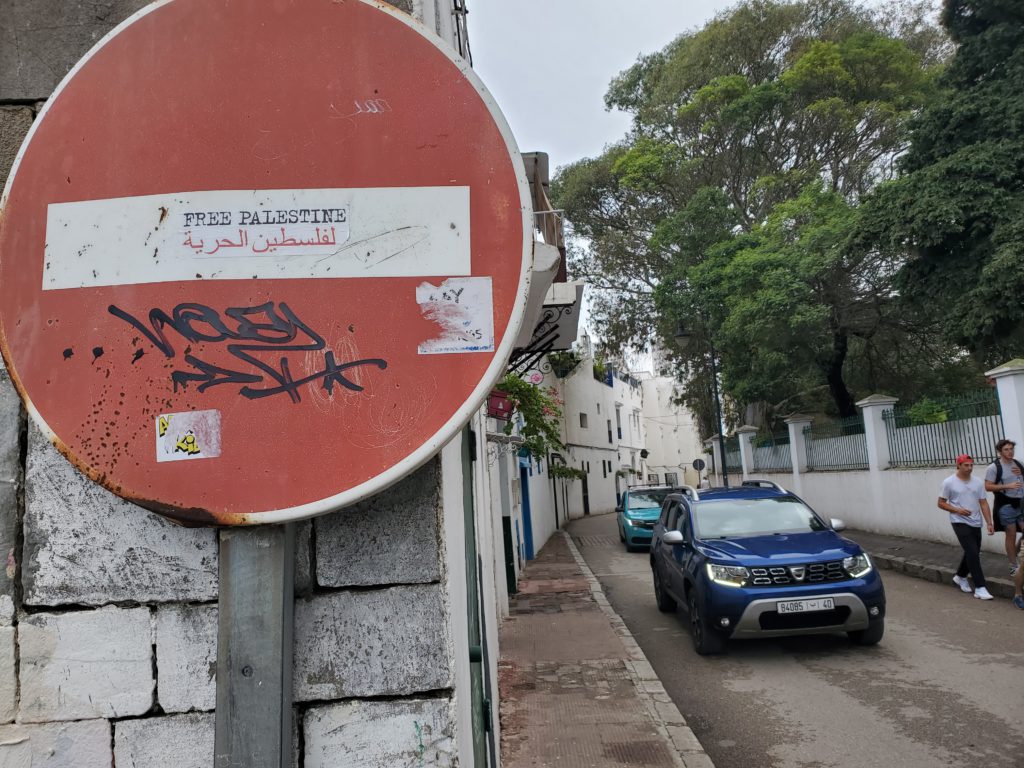
Late in the afternoon, I return to my lodgings to find them deserted, so I decide it’s time to do some work and writing. Friday, I stay in for the day, taking advantage of the cheap price and lack of socializing to continue working, leaving only to get dinner at the same restaurant as yesterday, anticipating another delicious meal. I order tangia, a sort of pot roasted lamb. The menu says “one half kilogram” but when it arrives it’s a very small portion. When I ask about it, the server checks with the cook and comes back with the answer, “That’s the weight before cooking.” Although it tastes good, either I’m being cheated or the meat has shrunk down to almost nothing on the stove. The measly quantity makes it disappointing. Well, one good meal out of two is at least something when you pick a restaurant at random.
In the evening, another guest arrives and we get to talking and take a quick liking to each other. He is Raphael, on a long journey from São Paulo, Brazil. Since I’ve traveled extensively in his country, the conversation comes easily. He is going to Hercules’ Cave tomorrow before leaving Tangier by train. I want to visit the cave, too, so I offer him a ride.
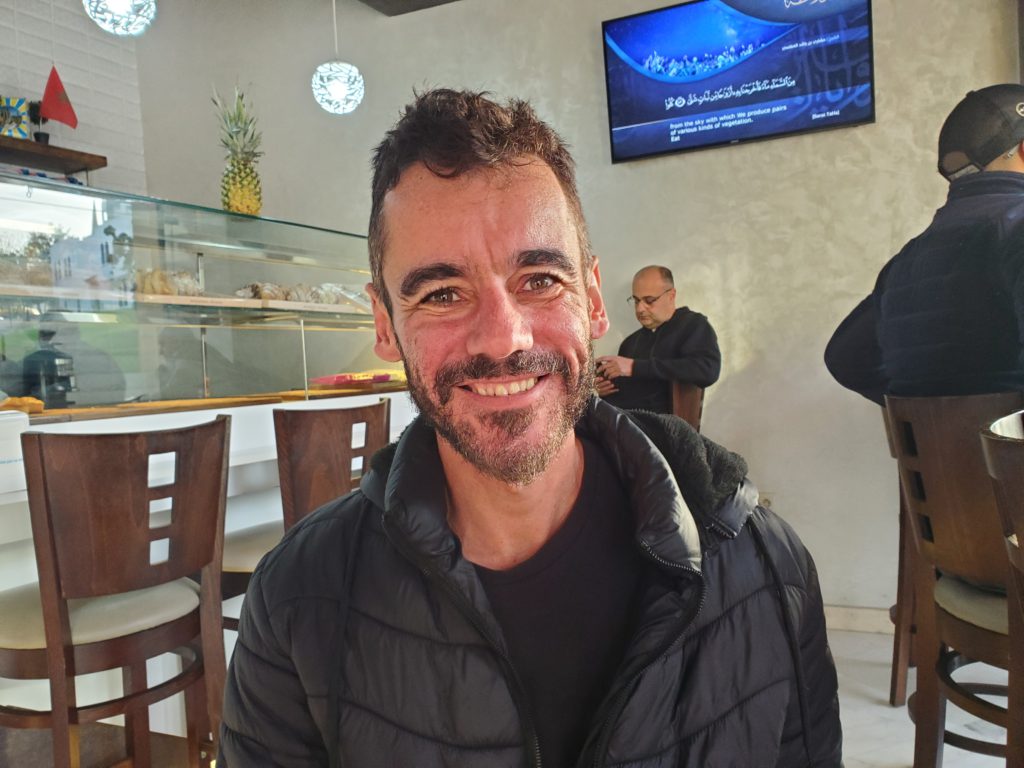
Saturday morning, Rafael and I set out for the short drive to the cave. It has a rich legendary history, including that Hercules slept there, that it’s one end of a 15 mile tunnel to Europe, and that the Barbary macaque monkeys used that tunnel to reach Gibraltar, their present day home. The facts alone, are impressive, though. Archaeological studies show it was inhabited by Neolithic people about 8,000 years ago. The cave has openings both to the land and sea and it seems true that the seaward opening was artificially created by the seagoing Phoenicians. Berber people enlarged the cave by cutting stone mill wheels out of its walls.
The site of the cave is very scenic, perched above the ocean with a broad view down the coast. Since we’re west of the Strait of Gibraltar, the surf is fully oceanic and waves crash satisfyingly against the rocky coast.
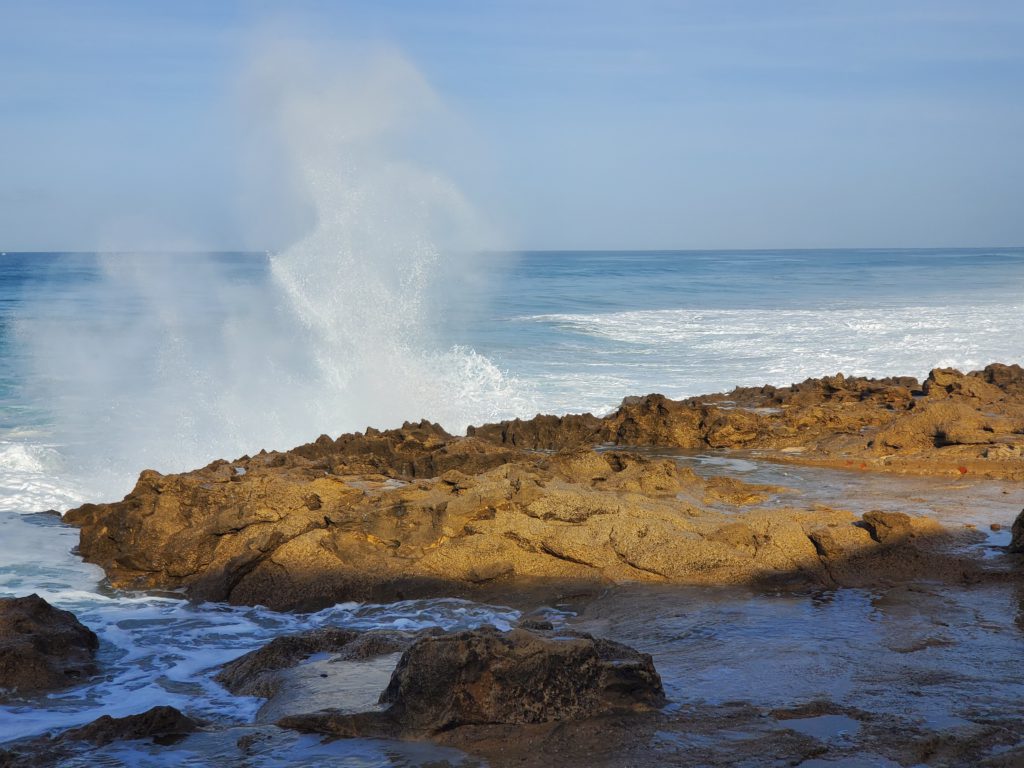
Rafael and I walk down to the cave entrance and ticket office. The entry fee is $6 and since it’s a small cave, I decide it isn’t worth it. As Rafael buys a ticket, I turn back to leave but one of the staff motions me inside for free. I have no idea why but I don’t object when someone offers me celebrity status (this was the first time ever). Inside there’s a nice effect of the ocean swell breaking inside the cave mouth. I’ve read the sunset from here can be spectacular but I’m not waiting all day to see that, of course.
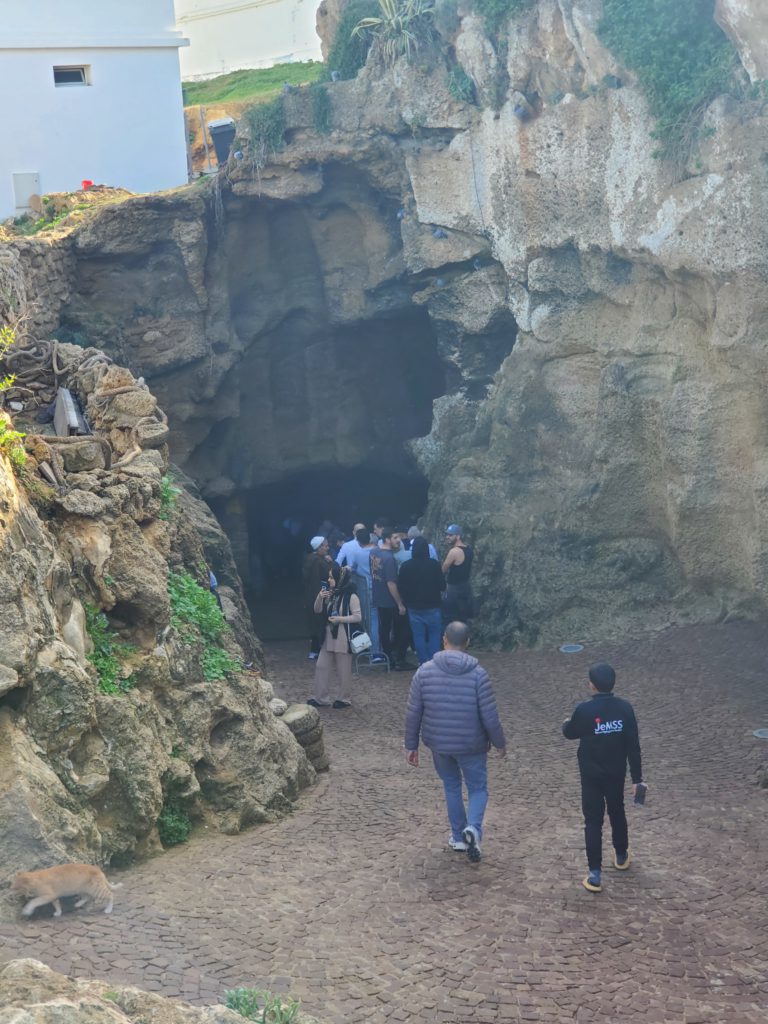
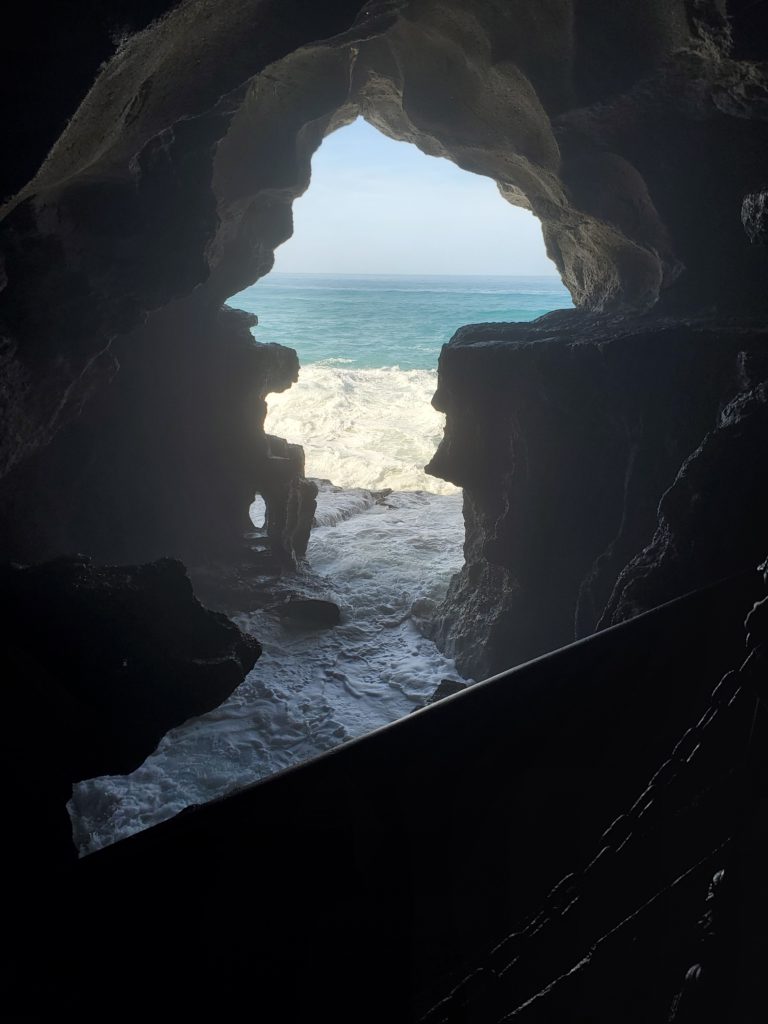
I’ve offered to drive Rafael to the train station after our cave visit but since I’m heading past his destination anyway, he decides to ride with me. We head south down the coast road and suddenly I’m waved to the curb at a Gendarme (national police) checkpoint. Apparently, I’ve been caught on radar going slightly over the speed limit. The police tell me I have to pay a $15 fine on the spot, in cash. This drops me immediately into my foreign police interaction mode, since it’s my policy never to pay cash to police on the roadside as that’s a very clear indicator of corruption. I do my best to”slow walk” the process but it’s made difficult because one of the policemen speaks some English. My first maneuver is claiming to have no cash on me. Do you take credit cards? No, of course not. Then I inquire about court hearings and reviewing the evidence in front of a judge. No, is the answer. You must pay here or we take your license. This is actually a feasible alternative for me since I carry two driver’s licenses, but it is a last resort. If this is corruption, I try to make it take so long that the officers decide there’s more money to be made by moving on to the next victim. Over the course of about 30 minutes, they’re not budging and I see no evidence that these guys are shaking me down for personal gain. They’re writing an official ticket and I get a copy, so it looks legitimate. Since the fine is nominal, it eventually “occurs” to me that I can ask my “hitchhiker” if he has the currency, which lets me back out of my initial “no cash” claim. Fine paid, we move on to the beach town of Asilah where I drop Rafael off at his booked hostel.
I continue on to Temara, a suburb of the Moroccan capital, Rabat, to have a reunion with a Moroccan I met 21 years ago.





